Latest updates: all new material added to the site

Border externalisation: "new and innovative" solutions for migration control
Category: News
The latest issue of our bulletin on EU border externalisation policies includes: plans to pay third countries to intercept and detain irregular migrants, an update on visa sanctions as leverage for deportation cooperation, a new EU-funded pullback coordination centre in Eastern Libya and the EU's partnership with the Taliban for deportations

Leaked EU paper envisions dumping migrant sea rescues onto non-European states
Category: Press coverage
EUobserver, 29 January 2026.

Invoking the "instrumentalisation" of migration, the UK follows in the EU's footsteps
Category: Analysis
In 2025 the UK announced a new sanctions regime targeting alleged people smugglers. It makes use of the “instrumentalisation of migrants” narrative that has been increasingly invoked by the EU since the early 2020s. This article explains what this narrative is, the powers it is used to justify and how it contributes to the degradation of migrant and refugee rights.

Film screening: Viva Palastina: Reason of Resistance
Category: Events
Join MayDay Rooms, the Palestinian Youth Movement Britain and Statewatch for a screening of the documentary 'Viva Palastina: Reason of Resistance', examining the repression of the Palestinian solidarity movement in Germany.

Greece: Criminal law used to target civil society organisations
Category: News
The Greek government's latest move to stifle the work of civil society groups has been condemned by more than 70 organisations, including Statewatch, as unjust, unlawful and unreasonable.

Raport i brendshëm i BE-së: Schengeni po kthehet në një fortesë
Category: Press coverage
Albanian Post, 22 January 2026.

Schengen borders: more deportations, surveillance and militarisation in the works
Category: News
An internal EU report obtained by Statewatch offers an update on efforts to strengthen border and immigration controls in the Schengen area in the first half of 2025. The report reflects a desire to step up the anti-migrant policy agenda pursued by European policymakers in recent years – more deportations, more surveillance and more militarisation of borders.

Ue-Usa: l’accordo per i dati privati di tutti gli europei
Category: Press coverage
Il Fatto Quotidiano, 18 January 2026.

Ausweitung der Passagierdatenspeicherung: EU plant Überwachung von sämtlichen Reisewegen
Category: Press coverage
Der Standard, 18 January 2026.

Surveillance of travel routes: EU plans to expand passenger data storage
Category: Press coverage
Heise, 17 January 2026.

EU member states want to expand police surveillance of travel
Category: News
In the name of fighting crime and terrorism, EU law requires mandatory police surveillance of international air travel. Governments are now considering surveillance of all other modes of transport, in particular maritime travel. They also want to use data for new purposes, such as immigration control. A working group has been set up to consider new legal proposals.

Prints in politics: cheap, easily replicated and widely accessible
Category: News
Printmaking is an ideal medium for wide and diverse engagement with art: it is replicable, cheap, and widely accessible. These features have made prints particularly attractive to political activists looking to inspire collective mobilisation. The Statewatch Library & Archive contains a number of examples of the medium, from a wide variety of movements.

Why Europe Is Quietly Deporting Nigerians
Category: Press coverage
The Insight, 12 January 2026.

EU to increase lethal migration cooperation with Libya
Category: News
The EU is set to fund migration control infrastructure in the eastern region of Libya, a move that will increase cooperation with general Khalifa Haftar, once a pariah to western states. The plan to extend EU cooperation into eastern Libya comes despite long-standing condemnation of Libyan and EU involvement in human rights abuses, shooting at NGO vessels, and accusations of crimes against humanity.

Battered by EU’s border bandits
Category: Press coverage
The Nation, 3 January 2026.

IOM uses UN immunity to avoid scrutiny of Greek returns
Category: Press coverage
The New Humanitarian, 22 December 2025.

Biometrics Deal: EU Council Paves Way for US Data Exchange
Category: Press coverage
Heise, 18 December 2025.

Reclaiming migration: a call for justice, dignity, and an anti-racist Europe
Category: Statement
To mark International Migrants Day more than 40 organisations, including Statewatch, are calling for "a Europe grounded in justice and equality" and "policies that honour dignity and rights of all."

US access to EU citizens’ biometric data: ministers approve EU negotiating mandate
Category: News
EU ministers have agreed to launch negotiations on an agreement that would grant US border agencies direct access to personal data stored in EU member state databases, and give EU agencies similar access to US data. The US is demanding access to the databases of all states that are part of its Visa Waiver Programme, for “immigration screening and vetting activities.” This is part of a broader plan to massively increase the amount of sensitive data gathered on travellers.

UK: ‘Radio Nick’: a private spy hired by the police
Category: News
In October, a court case led to the exposure of a private spy who had been hired by the police to infilitrate multiple campaign groups for almost a decade, Nick Gratwick. A new report by the Undercover Research Group documents Gratwick's activities in the late 1990s and early 2000s in detail. The case highlights the lack of laws and regulations governing private intelligence agents.

Inside the EU’s flawed $200 million migration deal with Sudan
Category: Analysis
Amid the horrors of the Sudan civil war, questions are once again being raised over what role EU funds have played in the ongoing conflict and, in particular, alleged genocide in Darfur at the hands of the Rapid Support Forces militia. Statewatch is republishing a powerful 2018 article by the journalist Caitlin L Chandler for The New Humanitarian, which explains the background to and effects of the EU’s “migration management” cooperation with Sudan.

Deportacije ne glede na lokacije
Category: Press coverage
Radio Student, 10 December 2025.

UK: Joint briefing on the “do not introduce digital ID cards” parliamentary petition debate
Category: News
In September, the government announced plans for a new digital ID scheme that would be mandatory for ‘right to work’ checks by 2029. A petition against the proposal accrued nearly three million signatures, making it the fourth largest petition in British history and the second largest non-Brexit petition. It highlights problems with: mission creep; privacy; security risks; accuracy; discrimination and exclusion; and fundamental changes in the relationship between the state and the individual.

How the EU migration pact will increase harms in Serbia and along the Balkan route
Category: Analysis
The EU's Pact on Migration and Asylum is likely to send the situation for migrants and refugees in the Balkans from bad to worse: more containment of people on the move through cruel tactics such as policing and pushbacks; more bureaucracy and digital controls, without protection or safeguards; and a further closure of civic space. Real protection requires a different approach.

Exporter la “gestion” carcérale des migrations : 30 millions d’euros de l’UE vers le Sénégal
Category: Analysis
30 millions d’euros provenant du budget d’aide au développement de l’UE ont été alloués au Sénégal pour le contrôle des migrations. L’examen de documents de la Commission européenne met clairement en évidence l’objectif principal de ce financement : la surveillance et le contrôle des frontières, l’interception maritime des personnes tentant de quitter le Sénégal pour rejoindre le territoire européen, ainsi que les infrastructures d’accueil/détention.

Border externalisation: radical expansion of Frontex powers in the works
Category: News
The latest issue of our bulletin on EU border externalisation policies includes: council discussion documents on upcoming Frontex mandate revision; the IOM presents a dire picture for returnees to Afghanistan; and an internal human rights presentation warns the EU is "not there yet"

Documents: EU plans to radically expand border agency's mandate
Category: News
Two recent European Council documents reveal internal discussions over the potential expansion of Europe's border agency Frontex. One aim is to make it easier for the agency to operate outside EU borders. The discussions come ahead of the expected formal revision of Frontex’s mandate in 2026 and give a glimpse of what member states and the European Commission have in mind for the agency’s role in the EU’s future deportation machine.

Networks of (in)security: how global counter-terrorism and security norms threaten civic space and human rights
Category: Publications and reports
Global counter-terrorism and security norms are propelling the introduction of pre-emptive, automated and algorithmic forms of surveillance and profiling, says new research published today by Statewatch. This is reinforcing racism and discrimination, inhibiting free movement, and giving authoritarian states new tools of control. The research calls for an organised response to this long-term state project, and sets out some guiding questions for future work.

Networks of (in)security: how global counter-terrorism and security norms threaten civic space and human rights
Category: News
Global counter-terrorism and security norms are propelling the introduction of pre-emptive, automated and algorithmic forms of surveillance and profiling, says new research published today by Statewatch. This is reinforcing racism and discrimination, inhibiting free movement, and giving authoritarian states new tools of control. The research calls for an organised response to this long-term state project, and sets out some guiding questions for future work.

UK: Inquiry needed over lack of enforcement against "egregious and repeated data breaches"
Category: Open letter
More than 70 civil society organisations, academics and data protection experts, including Statewatch, have called for an inquiry into the collapse in enforcement activity by the Information Commissioner’s Office (ICO). The call comes after the ICO failed to launch an investigation after the Ministry of Defence published a spreadsheet containing the details of over 19,000 people fleeing the Taliban in Afghanistan.

Exporting carceral migration “management”: €30 million from the EU to Senegal for migration control
Category: Analysis
€30 million from the EU's aid budget has been provided to Senegal for migration control. An examination of European Commission documents makes clear the main focus of the funding: border surveillance and control, maritime interception of people trying to leave Senegal to travel to European territory, and reception/detention infrastructure.

Document: Drones - internal security implications
Category: Document
A document circulated by the Danish presidency of the Council of the EU on 11 November sets out internal security issues raised by the use of drones, and outlines measures being put in place by the EU to try to address the problem. The aim is to prepare a discussion due to take place at the Justice and Home Affairs Council meeting in December.

EU-Staaten uneins über US-Zugriff auf Polizeidaten
Category: Press coverage
Netzpolitik, 12 November 2025.

US searching for “security threats” in European data: not a problem for EU member states
Category: News
US law enforcement authorities want direct access to EU member state police and immigration databases to identify people considered “a threat to US security.” They may also be seeking access to EU databases. Some member states have concerns over timing, the legal basis and data protection requirements, according to a document obtained by Statewatch – but none have any fundamental problems with the proposal.

Europol, une technopolice de plus en plus insaisissable
Category: Press coverage
Paperjam, 11 November 2025.

How Europol is cozying up to Microsoft, Palantir, Clearview & Co.
Category: Press coverage
Heise, 10 November 2025.

European Parliament: Development committee report pushes to use aid as migration leverage
Category: News
The European Parliament’s Committee on Development (DEVE) is set to debate a report today that supports using development aid to encourage migration control cooperation by non-EU states.

Border externalisation: new documents show EU states want to further ease deportations
Category: News
The latest issue of our bulletin on EU border externalisation policies includes: second revision of the deportation Regulation proposal; the EU parliament's development committee urged to tie aid to deportation cooperation; and the Danish Presidency of the Council of the EU hailing Turkey-EU migration cooperation as a "success".

UK: Politicians must "stop using our human rights as a scapegoat"
Category: News
Almost 300 organisations, including Statewatch, have called on the UK government to defend the European Convention on Human Rights (ECHR). Government ministers and opposition politicians in both the UK and across Europe are demanding changes to, or even withdrawal from, the ECHR, claiming it prevents them from introducing more restrictive immigration policies.

EU: New Handbook offers guide to privacy and data protection for immigration and asylum practitioners
Category: News
Statewatch is publishing a handbook that explains how data protection law can be used to seek remedies and redress for people in the EU’s immigration and asylum systems. Aimed at lawyers, case workers, volunteers and others working on immigration and asylum cases, it offers an overview of key digital technologies, and privacy and data protection concepts and cases.

Data Protection Handbook on Asylum and Migration in Europe
Category: News
The EU’s immigration and asylum system is governed by a complex set of rules. As well as being regularly amended by legislators, those rules are also subject to frequent interpretation (and re-interpretation) by the courts. The increasing use of digital technologies and databases for the enforcement of immigration and asylum law adds a further twist to this complicated scenario.

Behind closed doors: Europol’s opaque relations with tech companies
Category: Analysis
As part of its research into the expanding—and largely unchecked—use of AI by EU security agencies, Statewatch delves into largely uncharted territory: Europol’s links with the private sector. A survey of this landscape reveals conflicts of interests, secrecy and opacity, and a whole array of intrusive and invasive technologies that Europol would like to adopt, and make more widely available to European police forces.

US attacks on the international rule of law: will the EU do anything?
Category: News
Last week, the Slovenian government called on EU justice ministers to “protect the international rule of law and justice system,” which is facing US sanctions due to attempts to bring Israel officials to justice for crimes committed in Gaza. The discussion has now apparently been taken from the EU Justice and Home Affairs Council to “other Council formations.” Whether any practical steps will follow remains to be seen.

US sanctions against Palestinian groups must be immediately withdrawn, say 80 organisations
Category: Open letter
United States sanctions against three Palestinian human rights organisations have been condemned by 80 organisations, including Statewatch. The US government has frozen the financial assets of Al-Haq, Al-Mezan Center for Human Rights, and the Palestinian Centre for Human Rights. Organisations subject to US jurisdiction are prevented from engaging in transactions with them. The open letter calls on the US government to "immediately rescind the sanctions."

EU wants more transparency in implementation of new global cybercrime convention
Category: News
The UN Convention on Cybercrime was adopted on 24 December 2024. Signatory states must introduce a range of criminal offences related to cybercrime, as well as powers for the prevention, detection, investigation and prosecution of those offences. Rules of procedure will set out mechanisms for oversight and monitoring of the Convention, but a draft set of rules has been criticised by civil society groups for their “weak procedures”. An EU paper calls for improvements.

EU Expands Migration Control Partnership with Ivory Coast
Category: News
News Ghana, 9 October 2025.

Slovenia demands EU reponse to US attacks on judicial indepencence and the rule of law
Category: News
The Slovenian government wants EU justice and interior ministers to discuss "how to protect the international rule of law and justice system" in the face of "continued targeting of international judicial and human rights mandate holders by U.S. sanctions." A document obtained by Statewatch requests a discussion at the Justice and Home Affairs Council meeting next week.

Border externalisation: Documents reveal ongoing efforts to outsource immigration control
Category: News
The latest issue of our bulletin on EU border externalisation policies includes: updates and documents on the Atlantic, Mediterranean and Balkan 'routes'; priorities for Ethiopia and Somalia; member state comments on the "safe third country" and "safe country of origin" proposals; and much more.

Franco-British "one in, one out" deal condemned as absurd and dangerous
Category: Statement
British and French organisations, including Statewatch, have denounced the "one in, one out" deal between the French and British governments. The deal is ostensibly aimed at limiting unauthorised migration across the Channel/La Manche. The statement, published in Le Monde, highlights the dangerous consequences for migrants' rights.
Annual activity report 2024
Category: Publications and reports
Seeking optimism in troubling times

EU deportation proposals: the member states sink to new depths
Category: News
A new compromise text for the upcoming deportation Regulation was recently circulated by the Danish presidency of the Council of the EU. Alongside two other legal proposals currently under discussion, the deportation Regulation forms the legal basis for the EU’s plan to increase deportations, in particular by forging new ‘Euro-Rwanda’ deportation schemes. The latest text makes even more cuts to safeguards and protections.

EU Council seeks swifter deportations with even lower standards on “safe” countries
Category: News
Discussions are ongoing in the Council of the EU on proposals to establish an EU list of “safe countries of origin” to which people can be deported, and to revise the principle of the “safe third country.” The Danish presidency of the Council, taking into account delegations’ comments, presented proposed new versions of the texts at the beginning of September.

UK: Police footage of protests can be held for decades
Category: News
Police in London and across the UK regularly film protests, with multiple officers often deployed to do so. A response to a recent freedom of information request says that footage of “a public order event without targeted individuals” can be held “for a period of up to 6 years.” However, if it contains “intelligence” it can potentially be held for decades.

Bosnia and Herzegovina: “a society that has gone through a genocide is more prone to it happening again”
Category: News
The Srebrenica massacre remains the only event on European soil since the Holocaust to be formally recognised as genocide - and, in a tale all too familiar, it unfolded as Europe looked on.

More profiling and surveillance under new EU anti-money laundering rules
Category: News
Last year, the EU adopted new rules against money laundering and terrorist financing. Member states are currently implementing the rules that will come into force in July 2027. Dutch non-governmental organisation Privacy First is calling for safeguards to prevent unchecked surveillance, monitoring and profiling.

EU wants to deport people to countries with which they have no connection
Category: News
A German diplomatic cable obtained by Statewatch shows that 13 member states would like to be able to deport people to any country they wish – even if the person has no connection to it. The demands have been accommodated in the most recent version of the proposed law on “safe third countries.” The cable also shows plans to remove the “suspensive effect” of appeals against deportation, while refugee resettlement pledges from member states are lower than ever.

Document: Trends and dynamics in international right-wing extremism and terrorism
Category: Document
A document circulated in the Council of the EU in early July on the issue of international right-wing extremism and terrorism. The note says: "Transnational links between foreign VRWE groups are increasing, with the phenomenon of accelerationism posing the most concerning threat."

EU deportation law must be rejected
Category: Statement
The EU's proposed deportation law must be rejected by governments and MEPs, says a statement signed by more than 300 organisations from across Europe and beyond. The proposed law, which was published in March this year, would facilitate massive rights violations. It includes provisions for offshore deportation centres, the elimination of safeguards and increased detention periods, amongst other things.

Celebrating the life and legacy of Tony Bunyan
Category: Events
Join us as we celebrate investigative journalist Tony Bunyan’s life and work exposing state violence and documenting popular resistance.

Participants in Israeli "counter-terrorism" summit must withdraw
Category: Statement
State officials planning to participate in a "counter-terrorism" summit hosted by Reichman University in Israel must withdraw, says a statement signed by more than 50 organisations, including Statewatch. The statement says that participation in the event is "particularly unconscionable at a time when, just 80 kilometres away, over two million Palestinians are subjected to constant bombardment and mass starvation."

Border externalisation: Deportation law negotiations, EU budget proposals, projects in Africa
Category: News
The latest issue of our bulletin on border externalisation, Outsourcing Borders, is out now. Including: updates on EU deportation law negotiations; EU budget proposals and external migration control; details on EU projects designed to increase deportations and limit "irregular remigration"; and much more.

EU's deregulation agenda will undermine protections against surveillance and snooping
Category: Statement
The EU's so-called war on red tape risks undermining, sidelining or eliminating a vast number of rules designed to protect people from toxic pollution, corporate wrong-doing, exploitation, and misuse of data and surveillance powers. A statement signed by almost 500 organisations, including Statewatch, demands a change of direction.

€2 billion in 15 years: how Frontex finances Fortress Europe
Category: Analysis
Frontex, the European Border and Coast Guard Agency, pays out hundreds of millions of euros every year to EU and Schengen member states. The money supports the agency’s standing corps of border guards, operations at the EU’s external borders, and cooperation with non-EU states, amongst other things. Data visualised here shows the scale and scope of the funding provided by Frontex: more than €2 billion between the beginning of 2008 and the end of 2024.

EU-funded aggression: How years of impunity led to the attack on the Ocean Viking
On 24 August, members of the so-called Libyan Coast Guard spent 20 minutes firing hundreds of bullets at humanitarian workers and rescued people on board the Ocean Viking. The attack is the result of years of EU funding, coordination and policy empowering violent actors in an attempt to seal its borders from refugees. What happens next will determine whether international law is reaffirmed or erased entirely.

EU budget proposals: more external migration control, less democratic scrutiny
Category: News
In mid-July, the European Commission published its proposal for the EU’s next long-term budget, for the period from 2028 to 2034. The Commission wants €200 billion for “external action” – a 75% increase from the current budget. Within this, external migration control remains a high priority. The Commission wants to penalise states that don’t comply with EU migration policies, whilst undermining official development aid standards and limiting democratic oversight.

EU prepares to give US direct access to police and immigration databases
Category: News
The massive increase in violent immigration raids, detention and deportation underway in the US has put off many people from visiting the country. Soon there may be yet another reason to think twice about taking a trip to the “land of the free”: US immigration and law enforcement agencies could be given the power to search European databases, to identify people posing “a threat to US security.”

Document: Exploitation of new technologies for extremist and terrorist purposes
Category: Document
A note from the Polish presidency of the Council of the EU to the Terrorism Working Party, circulated on 20 June 2025.

Greece: Illegal, violent deportations: the heavy toll of seeking asylum in Europe
Category: News
Asylum seekers in Lesvos report that violent pushbacks by masked Greek coastguard forces persist, involving physical abuse, strip searches, theft, and potential use of migrants as auxiliaries.

Moving borders with history: new ways of thinking about border externalisation
Category: Analysis
Europe is doubling down on its outsourcing of border controls to other states, particularly in Africa - and new ways of thinking about border externalisation are needed to generate effective responses. A recent academic article, summarised here, argues that postcolonial and decolonial analysis can help generate those responses.

UK: Facial recognition cameras too racially biased to use at Notting Hill carnival, say campaigners
Category: Press coverage
The Guardian, 16 August 2025.

UK: Peaceful protesters treated as terrorists as politicians fuel far-right activity
Category: News
Thousands of police were deployed to London last weekend to arrest more than 500 peaceful protesters, as racist protests took place across the country. There is a relentless crackdown on foreign nationals, now including immediate deportation for any non-citizen convicted of a criminal offence. Critics warn that mainstream political rhetoric is legitimating and fuelling violent far-right activity.

UK: More than 200 organisations sign open letter in response to anti-refugee protests
Category: Open letter
More than 200 refugee organisations, charities, trade unions and more have signed an open letter to party leaders today condemning the anti-refugee protests that took place across the weekend. Statewatch is a signatory to the letter.

UK: Authorities must clarify whether Online Safety Act will lead to Palestine protest censorship
Category: Open letter
A letter to the UK broadcast regulator and major social media companies seeks clarification over how online freedom of speech will be protected following the government's proscription of the organisation Palestine Action. The letter, signed by 24 individuals and organisations - including Statewatch - raises concerns that the Online Safety Act, combined with the UK’s vague definition of terrorism, could lead to lawful content being wrongly identified as illegal and removed.

Will the EU finally stop financing Israel’s genocide in Gaza?
Category: Analysis
Last Tuesday, the European Commission proposed to partially suspend Israel from its €80bn Horizon science research programme, citing the “severe” humanitarian crisis in Gaza. But this proposal comes late, after years of funding military-linked research with minimal transparency or accountability. As the death toll mounts and Gazans face man-made famine, the EU’s role in bankrolling violence is under scrutiny.

Austria legalises state spyware amidst strong opposition
Category: News
Austria is set to legalise the use of highly-intrusive spyware by state authorities. The government has justified the law in the name of monitoring encrypted messaging applications. Opponents warn that there is no way to prevent the authorities accessing reams of sensitive information on targeted individuals, despite official promises to the contrary. Civil society organisations and opposition parties have promised to challenge the law in court.

EU migration budget: What's planned for 2028–2034?
Category: News
InfoMigrants, 21 July 2025.

Frontex chases human rights activists for thousands of euros in court costs
Category: Open letter
EU border agency Frontex has been accused of "institutional intimidation" for demanding more than €11,000 in court costs from the sea rescue organisation Sea-Watch.

Italy's "systematic obstruction" of civilian search and rescue missions must end
Category: Statement
A statement signed by 32 organisations from across Europe calls for an immediate halt to the systematic obstruction of non-governmental search and rescue (SAR) efforts by the Italian state. In the past month alone, NGO vessels have been detained three times due to legal restrictions based on allegations under the “Piantedosi decree" (named after the current interior minister). One vessel, Nadir, operated by the organisation RESQSHIP, was detained twice in a row. Deliberately keeping non-governmental search and rescue organisations away from the Central Mediterranean causes countless more deaths at sea on one of the deadliest flight routes worldwide.

Next EU budget seen as funding migration crackdown
Category: Press coverage
EUobserver, 16 July 2025.

Frontex and deportation charter flights, 2006-2024
Category: Analysis
Data covering almost two decades of Frontex’s deportation operations shows the expanding role of the agency. We have produced a series of visualisations to show the number of people deported via Frontex-coordinated charter flights, the member states involved, the destination states, and the costs.

New report examines Frontex's growing role in West Africa
Category: News
A new report provides a critical examination of the evolving role of Frontex, the EU Border and Coast Guard Agency, in West Africa.

Exporting Borders: Frontex and the Expansion of Fortress Europe in West Africa
Category: Publications and reports
The EU is pushing its migration control far beyond Europe’s borders. This report, co-published with the Transnational Institute, exposes how Frontex operates in West Africa under the cover of cooperation, entrenching neo-colonial influence, undermining rights, and reshaping the Sahel into a securitised buffer zone.

EU police chiefs seek limits to “ambitious overhaul” of Europol
Category: News
Another upgrade to the powers of EU police agency Europol is in the works. The European Commission wants to see an “ambitious overhaul” so it can become “truly operational.” European police chiefs, however, are sceptical. A “strategic debate” amongst member state delegations is ongoing, but remains behind closed doors.


Frontex accused of failing to prevent pushbacks and child rights violations in the Balkans
Category: News
Frontex’s own fundamental rights watchdog has raised the alarm over pushbacks and serious protection failures in countries where the agency operates.

EU Border Software Vulnerable to Hacks, Confidential Reports Warn
Category: News
Bloomberg, 2 July 2025.

New Technology, Old Injustice: Data-driven discrimination and profiling in police and prisons in Europe
Category: Publications and reports
Police and criminal legal system authorities across Europe are increasingly using data-based systems and tools to ‘predict’ where crime will occur, to profile people as criminals and to assess the ‘risk’ of crime or criminality in the future.

Artificial intelligence, artificial security: Digital technologies and authoritarian politics
Category: Events
Join Statewatch and the Collaborative Research Center for Resilience to discuss the nexus between state power, digital technologies and security politics in Europe and the USA.

Europe urged to revoke UK's data adequacy status
Category: Press coverage
Computing, 5 June 2025.

EU states failing to uphold immigration data safeguards amidst renewed push for deportations
Category: Analysis
EU member states are violating laws designed to protect individuals from data abuse by police and immigration authorities, according to an official report. This should be a major cause for concern, given plans to introduce new laws to deport more people and ban them from returning to the EU. However, the report does not even name the countries that are failing to follow the law, posing massive challenges for democratic scrutiny and accountability.

IOM’s digital tool aims to speed up migrant removals, but at what cost?
Category: Press coverage
The New Humanitarian, 18 May 2025.

Data protection in immigration and asylum: Rights and opportunities for redress
Category: Events
Do you work with people in immigration or asylum proceedings? Do they face problems of secrecy and lack of access to information about their case? Would you like to know more about how data protection law can be used in migration and asylum cases? Join us for an online workshop on 8 May.

Automating Authority: Artificial intelligence in European police and border regimes
Category: Publications and reports
Artificial intelligence (AI) technologies are being embedded into everyday life by powerful actors, primarily motivated by profit. Police, border and criminal justice agencies are also looking to take advantage of the new powers AI offers for “security” policies, at both national and EU level. The EU is creating new infrastructure, away from the public eye, to allow the swift development and deployment of “security AI.” This will also reinforce the existing discrimination, violence and harm caused by policing, border and criminal justice policies. Exposing and understanding this emerging security AI complex is the first step to challenging it.

France: How the “war on drugs” is turbo-charging surveillance powers
Category: Analysis
A French law is set to unleash invasive new police surveillance powers. Fuelled by absurd rhetoric, the government is proposing what has been dubbed “the worst surveillance law in the EU”. Experts warn that it will fail to achieve its aims. However, the broad scope of the law means the powers can be used against migrants, their supporters, and to crack down on dissent. As official reports have made clear, dealing with drug use and trafficking requires long-term, low-tech policies – not high-tech police surveillance powers.

UK creating ‘murder prediction’ tool to identify people most likely to kill
Category: Press coverage
The Guardian, 8 April 2025.
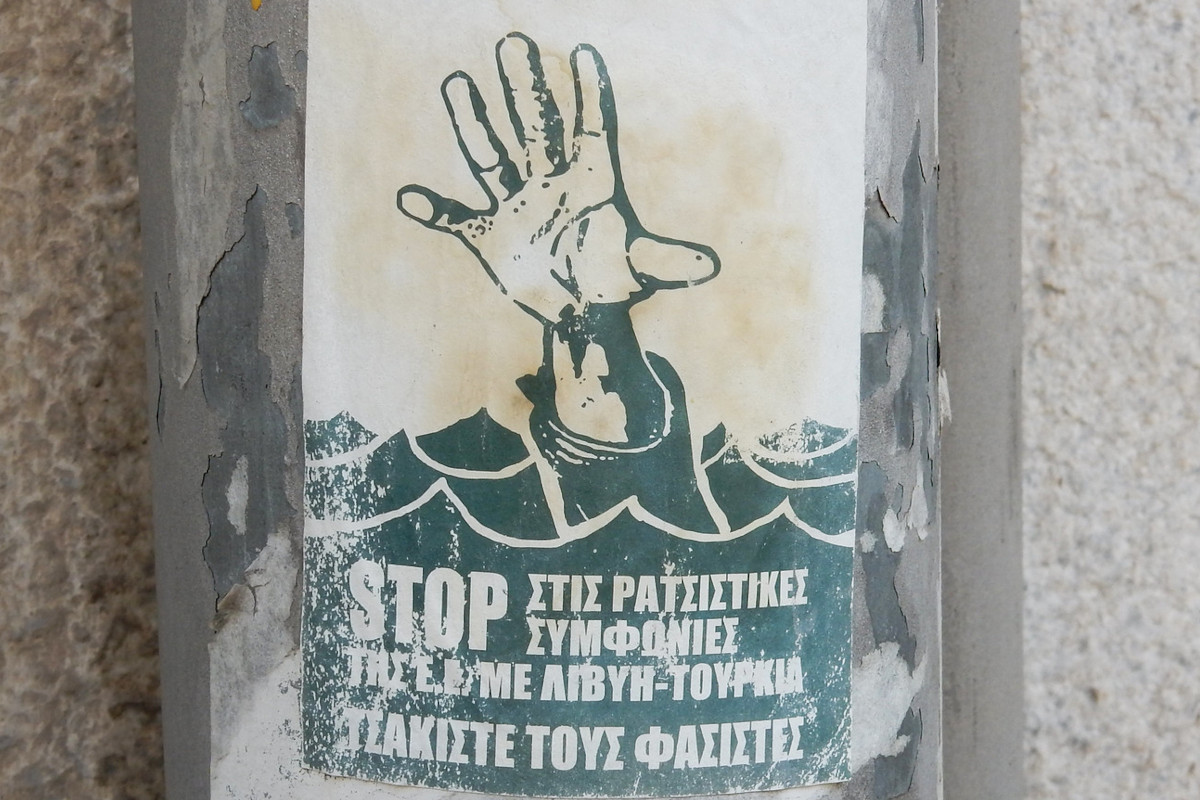
Impunity for war criminals and the European migration strategy in Libya
Category: Analysis
New leaked documents show that the EU’s “border assistance mission” in Libya is slowly expanding its work and is entering a “consolidation phase”. The efforts to “stabilise” the North African country include increased cooperation with Frontex. Meanwhile, in January, a wanted war criminal was arrested in Italy, only to be released and flown back to Libya on a government jet. This act made Italy and the EU’s reliance on third-state actors to maintain their migration policy clear. Politicians in Europe consider their migration policies so essential that they are willing to undermine the so-called rules-based international order to maintain them.
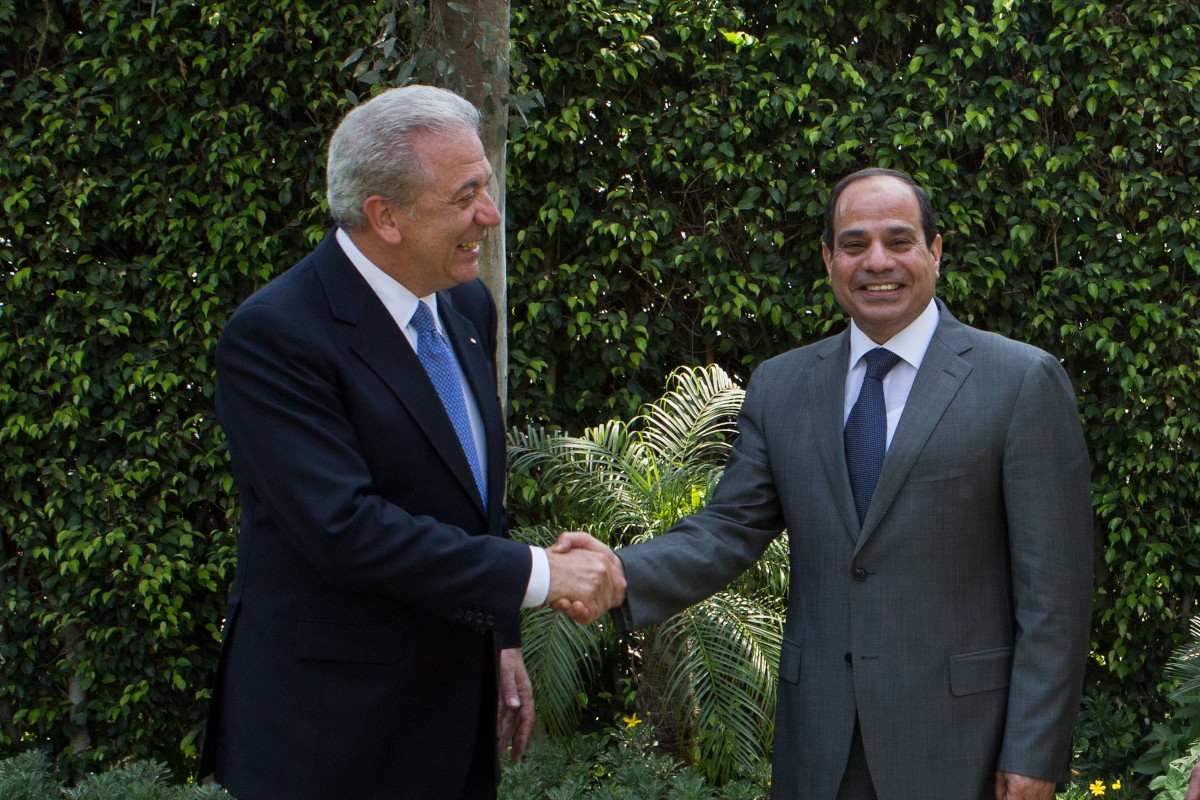
European support for Egypt: billions of euros for a dictatorial “partner” in migration control
Category: Analysis
A year ago, the EU and Egypt announced the launch of a “strategic and comprehensive partnership.” This comes with a €7.4 billion aid and investment package from the EU to Egypt. This article analyses this development in the context of regional changes, the ineffectiveness of “external solutions” to migration, and the impact of EU-Egyptian cooperation on human rights in Egypt. It argues that European support for Egypt underpins human rights abuses. Those abuses are then ignored or sidelined so that the EU can claim Egypt is a safe and reliable “partner” for managing migration.

"Größte Bedrohung": EU-Ratsspitze will anonyme SIM-Karten EU-weit verbieten
Category: Press coverage
Heise, 24 March 2025.

Film screening: Ultraviolence
Category: Events
Ultraviolence documents the struggles for justice by families of people killed by police in the UK. The screening is in support of the forthcoming People's Tribunal on Police Killings (PTPK). A speaker from the PTPK will be in attendance for a discussion session after the screening.

Italy: The end of the systematic denial of data protection rights?
Category: Analysis
Italy has been systematically denying people access to data about them stored in Europe’s largest policing and immigration database, statistics obtained by Statewatch show. Much of the data in question concerns entry bans and deportations orders. Knowing what information is stored is vital for peoples’ livelihoods and even their survival. EU institutions have known for years that mechanisms for the protection of individual rights were lacking. Now, victory in a long legal struggle may force the Italian state to comply with its obligations.
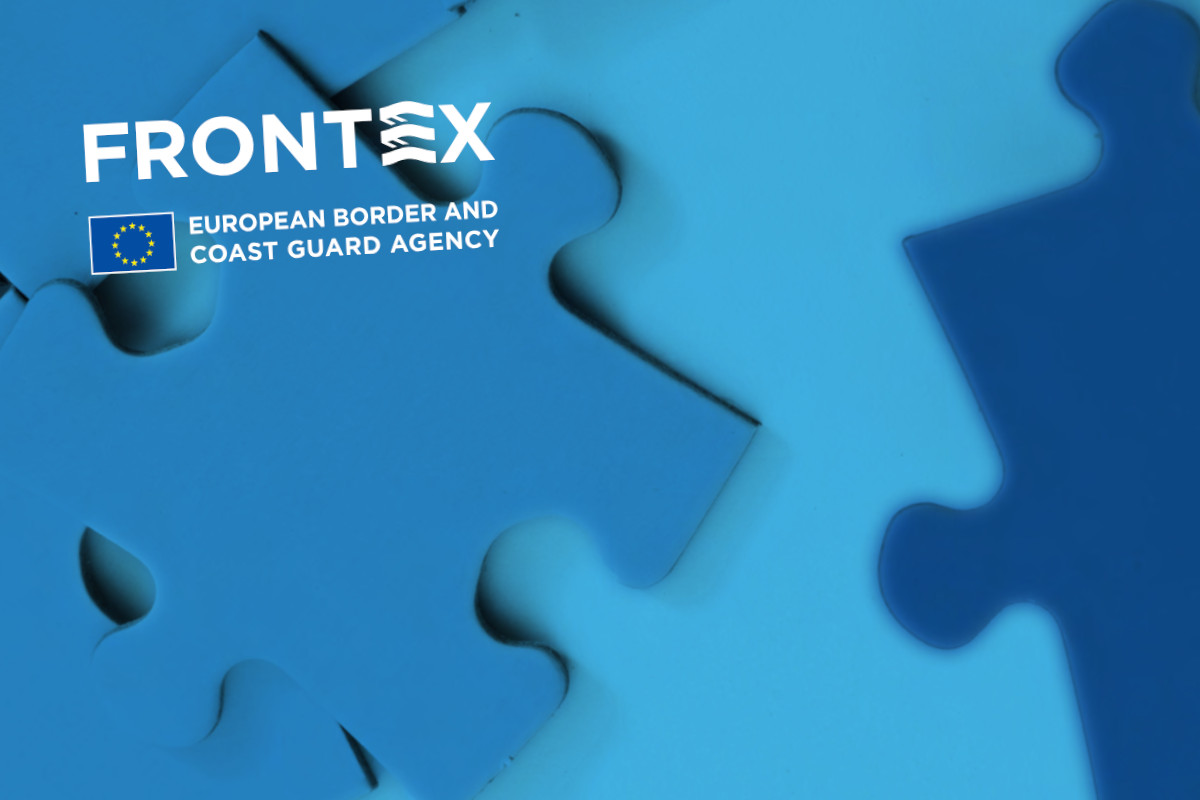
Violence at a distance: Frontex’s increasing role outside the EU
Category: Analysis
The EU tries to keep ‘unwanted’ people out by outsourcing border control to non-EU states. Frontex, the EU’s border agency, play a key role in a “web of violent deterrence” that is deeply-rooted in Europe’s colonial past. Every year, the agency publishes a report on its work in and with non-EU states. The latest edition demonstrates how its role has expanded, whilst glossing over or ignoring human rights violations.

Serial shipwrecks on the Libyan route: the price of deterrence
Category: News
In just one week in November, more than 600 people in unseaworthy vessels were intercepted on the high seas and taken back to Libyan shores, where conditions remain appalling. This is the result of cooperation between Italy, Frontex and Libyan bodies that flies in the face of international law.

The silence of Italy’s Guardia di Finanza on drones deployed in the Mediterranean
Category: Press coverage
Investigative Reporting Project Italy, 29 January 2025.
Digitalising discrimination and criminalisation
<p>Artificial intelligence, policing and criminal justice.</p>

EU: New migrant smuggling law to ensure criminalisation of solidarity
Category: Analysis
Next week, a new EU law on the criminalisation of migrant smuggling will be examined by the Justice and Home Affairs (JHA) Council. The Council is due to approve its position for negotiations with the European Parliament. The existing law has been criticised for failing to prevent the criminalisation of migration and acts of solidarity with migrants and refugees. The new text, obtained by Statewatch and published here, appears likely to worsen the situation.

The EU will soon have the largest hoard of biometric data on earth – and travellers could suffer
The Telegraph, 9 December 2024.

Will Frontex’s expansion lead to more oversight and accountability?
Category: Press coverage
The Parliament, 4 December 2024.
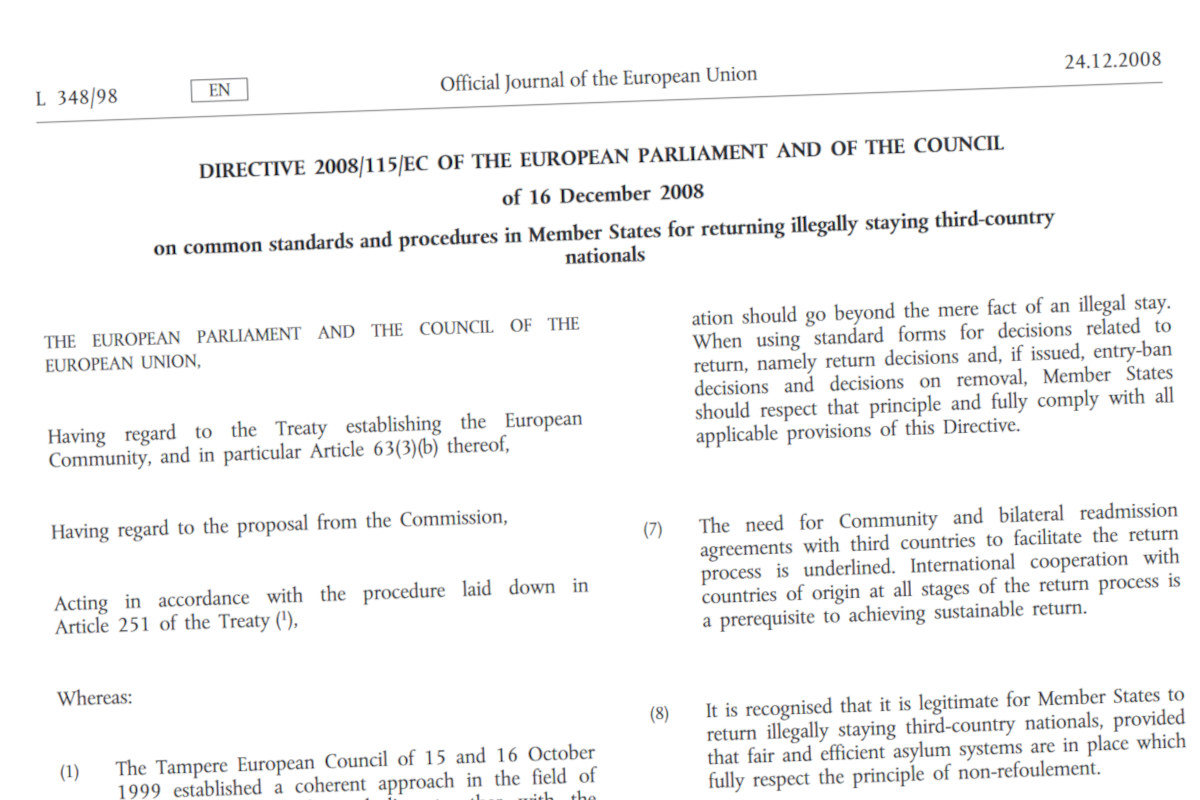
Deportations: when “assertiveness” and “effectiveness” entail violence and abuse
Category: Analysis
Increasing the number of deportations from the EU is a longstanding policy goal. In 2025 a new deportation law will likely be proposed, replacing the 2008 Returns Directive. Documents published alongside this bulletin offer some insights into what may be included in that proposal. The implications for individuals facing deportation are likely to be damaging: fewer legal safeguards, more obligations and increased coercion, and new ways to remove people to countries deemed unsafe.

Frontex’s increasing role in reintegration policy and its effects in West Africa
Category: Analysis
The externalisation of European border controls to Africa has received substantial political and critical attention. The same cannot be said of “reintegration” policies, ostensibly designed to support people deported from the EU. Frontex’s role in both deportation and reintegration is increasing. The consequences of this in The Gambia and Nigeria raise questions over national sovereignty, the rights of and support for deportees, and the instrumentalisation of independent organisations.

Deutschland drängt auf EU-weite Verfolgung und Überwachung von Fahrzeugen
Category: Press coverage
Heise, 17 November 2024.

Fondettes: une galerie expose « Calais après la jungle »
Category: Press coverage
La Nouvelle République, 15 November 2024.
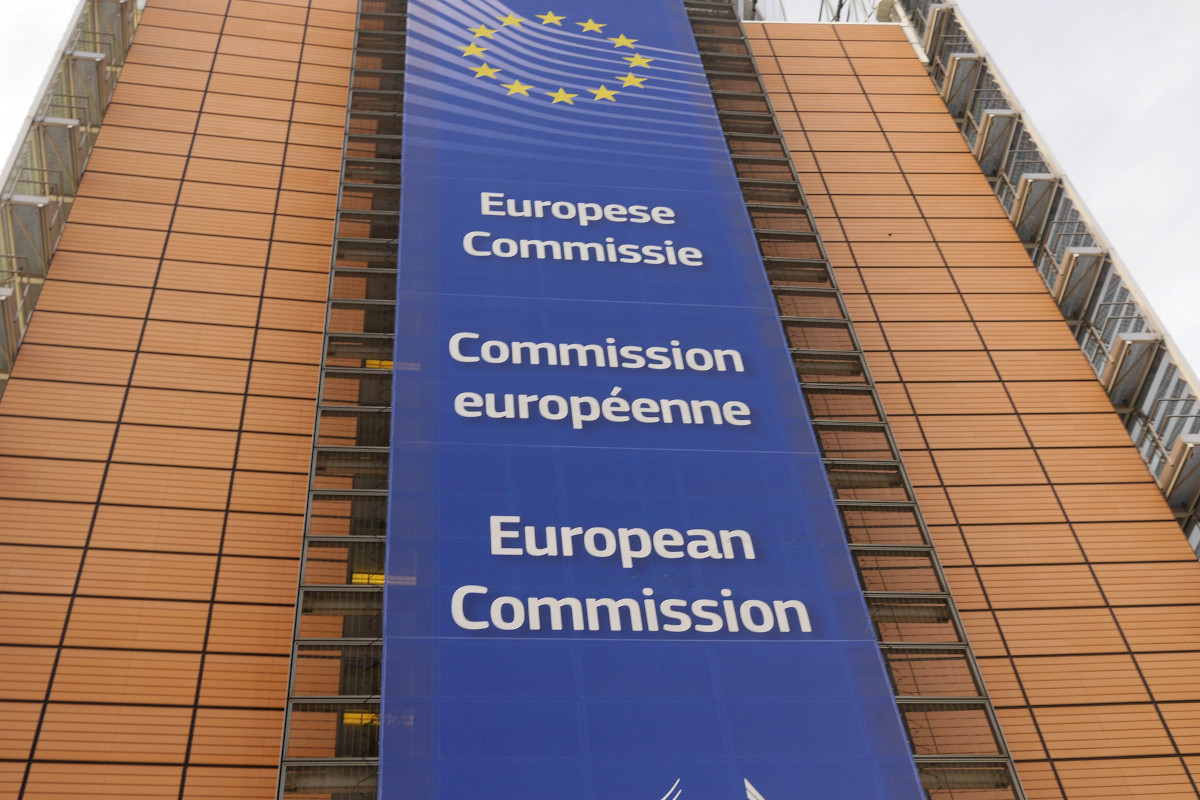
Migration policy priorities of the next European Commission: a jargon-free translation
Category: Analysis
This week, the proposed new European Commissioners are being interviewed by the European Parliament. Four of the 26 “mission letters” sent to the nominees by Ursula von der Leyen set out responsibilities with regard to migration, asylum and border policy. Couched in typical EU jargon, the texts hide a brutal and violent reality. Aside from the implementation of the Pact on Asylum and Migration, key topics in the coming months and years will include a new deportation law; attempts to set up deportation camps (“return hubs”) in non-EU states; new “partnerships” with non-EU states to try to control migration; and increased police powers.

Egypt and Tunisia ‘not interested’ in migrant deals with EU
Category: Press coverage
The Telegraph, 21 October 2024.

Egypt and Tunisia show 'little interest' in EU migration deal despite billions
Category: Press coverage
EUobserver, 14 October.

EU support for violent and authoritarian regimes: no end in sight
Category: Analysis
Migration across the Central Mediterranean has been a consistent topic in the EU for over a decade. In July, the Council’s Working Party on the External Aspects of Migration discussed a paper drafted by the Hungarian Council Presidency. Focusing on Egypt, Libya and Tunisia, it argues that challenges have “deepened and become more complex in 2023.” This includes dangers at sea and shortcomings in living conditions, infrastructure and humanitarian assistance on land. As is customary, there is little mention of the role played by EU migration policy in generating these “challenges”.

Ignoring the root causes of disaster: the EU and Sudan
Category: Analysis
In June, the Belgian Presidency of the Council of the EU circulated a paper on Sudan to the Working Party on External Aspects of Asylum and Migration (EMWP). The document offered an overview of the situation of war and displacement in this country, which has been ongoing since April 2023. It omits several issues that are crucial for a meaningful understanding of the situation.

EU und Kanada: Neues Abkommen zur Übermittlung von Fluggastdaten steht
Category: Press coverage
Heise, 4 October 2024.

Så gick Frontex från liten myndighet till högteknologisk propagandamaskin
Category: Press coverage
Dagens ETC, 3 October 2024.

L’Allemagne envisage de scruter les réseaux sociaux des demandeurs de visas Schengen
Category: Press coverage
Cameroun Actuel, 21 September 2023.
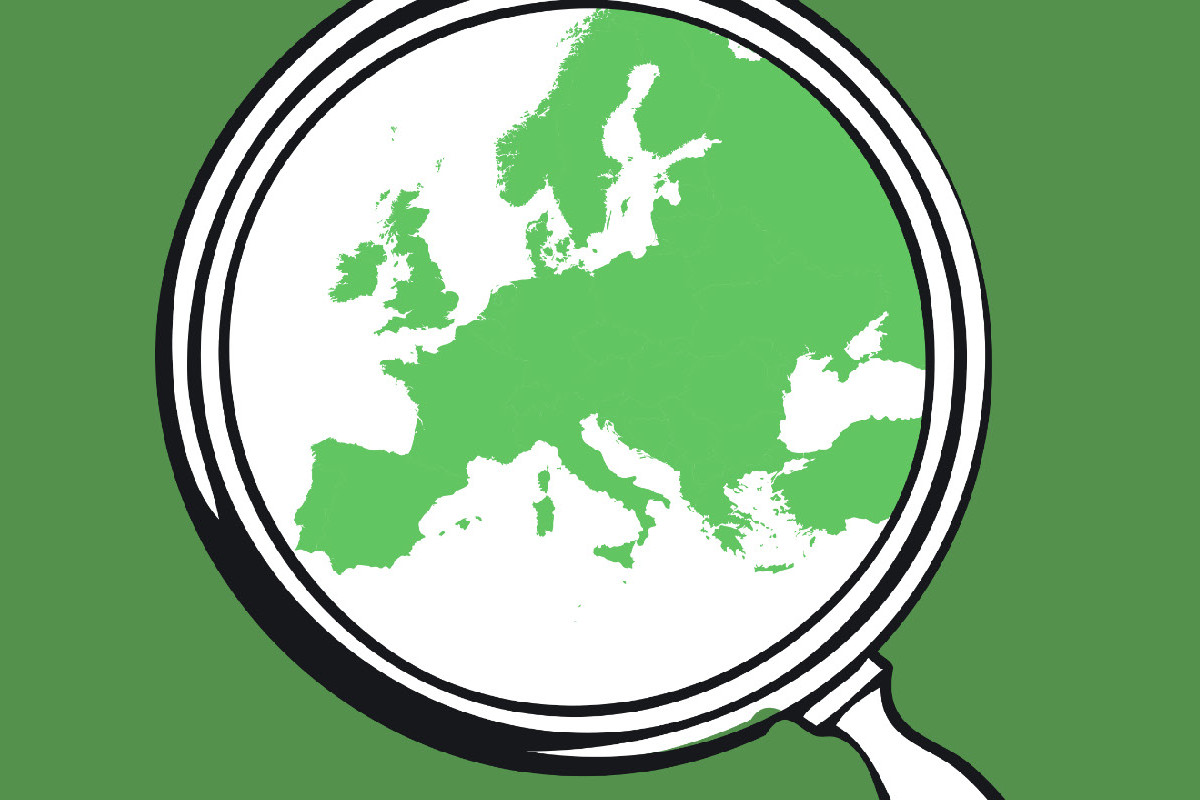
Annual activity report 2023
Category: Publications and reports
Civil liberties in an era of crisis and turmoil

How should Europe deal with its migration crisis?
Category: Press coverage
Al Jazeera's Inside Story, 16 September 2024.

Marruecos solo acepta el 8% de las expulsiones de sus nacionales emitidas por la UE
Category: Press coverage
El País, 11 September 2024.

What happens if I’m rejected for an Etias – and can I appeal?
Category: Press coverage
i, 26 August 2024.

Frontex goes drone shopping as EU looks to keep migrants out
Category: Press coverage
EurActiv, 21 August 2024.

Immigration : l’Europe veut « mieux criminaliser » les exilés et leurs soutiens
Category: Press coverage
l'Humanité, 21 August 2024.

La Unión Europea usará inteligencia artificial para controlar los flujos migratorios en las fronteras
Category: Press coverage
El Periódico de Catalunya, 1 August 2024.

How Sweden pushes for EU access to encrypted data
Category: Press coverage
EUobserver, 24 July 2024.
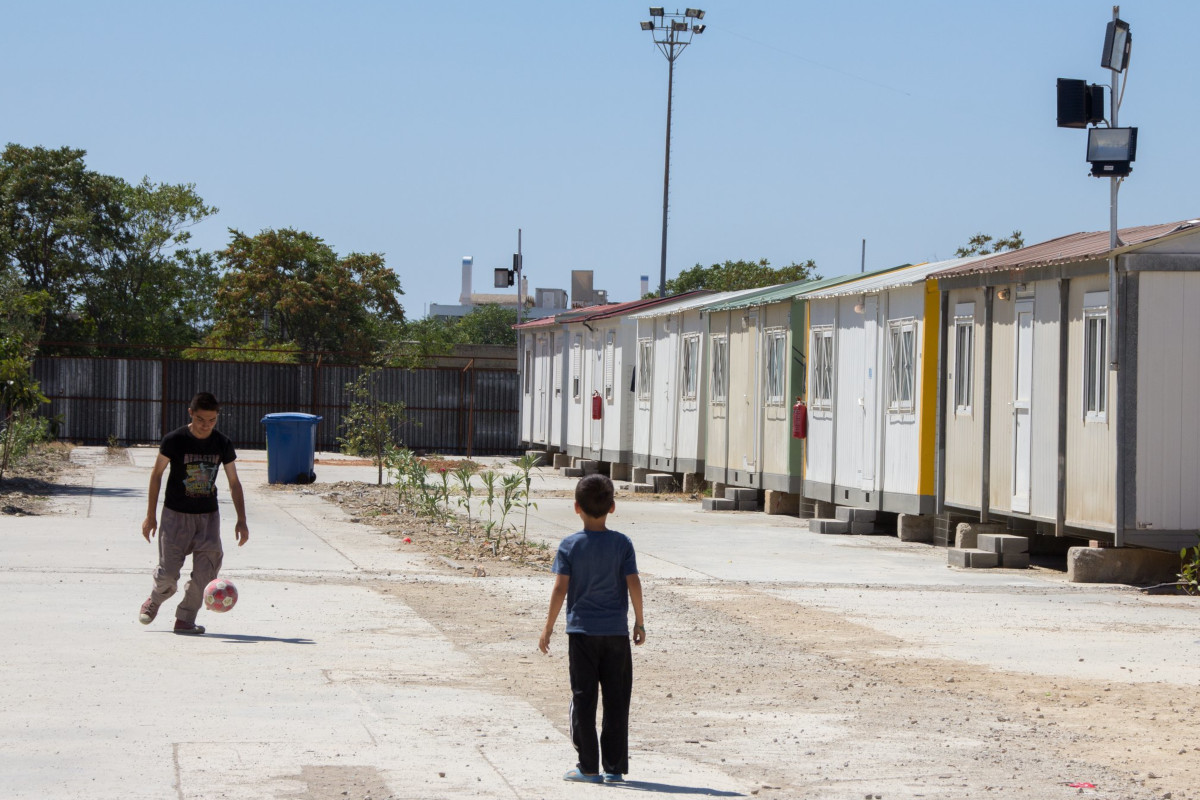
Implementing the Pact: obligation for fundamental rights monitoring
Category: Analysis
The recently adopted Screening Regulation under the EU Pact on Migration and Asylum sets out several requirements for the establishment and operation of a mechanism for monitoring the fundamental rights of people subject to “screening” procedures at the external borders. Based on a recent Council document on the implementation of article 10 of the Screening Regulation and EU Fundamental Rights Agency guidance, this article provides an overview of what is required and discusses some potential challenges that may arise.

Visa sanctions to increase deportations
Category: Analysis
Changes to the EU’s rules on visa issuance that came into force in 2020 have made it possible for sanctions to be introduced against states that fail to cooperate with deportations. For example, non-EU states that consistently fail to provide identity documents for their own nationals facing deportation from the EU can have visa fees increased, or the examination of applications slowed down. The tool appears to be popular with EU institutions and member states, and changes are on the way to “improve” its functioning. This analysis examines the mechanism itself, measures proposed or adopted under the mechanism, and recent proposals to develop and reform the system, and considers the way in which the idea of “solidarity” (between EU member states and EU bodies) is used as a weapon against third countries.

A bottomless pit: billions more euros for externalised border controls
Category: Analysis
In view of the recently concluded mid-term review of the EU’s budget, funding for the externalisation of migration control has been at the top of the political agendas of EU member states and institutions. In the words of the European Commission and the European External Action Service, funding “ensure[s] that the actions undertaken… continue delivering results.” A substantial increase in the EU budget is on the cards, at the same time as a possible shift towards a supposedly new “preventive model” for external migration control.

Come funzionano i voli di rimpatrio forzato dall’Italia alla Tunisia
Category: Press coverage
Internazionale, 24 June 2024.

The truth about the shadowy ‘Migration 5’
Category: Press coverage
Radio New Zealand, 17 June 2024.

Automating the fortress: digital technologies and European borders
Category: Analysis
The fortification of Europe’s borders is inherently linked to the use of digital technologies. Indeed, the process would be unthinkable without them. From the biometric passports and automated gates used at border crossing points to the drones, sensor systems and detection technologies used to prevent and detect unauthorised migrants, digital technologies are crucial to a political project that seeks to give state authorities increased knowledge of – and thus control over – foreign nationals seeking to enter the EU. Vast quantities of public funding have been used to develop and deploy these technologies, and unless there is significant public and political opposition to the project, it is likely that the EU will provide far more money in the years to come. Given the harm caused by the ongoing reinforcement of Fortress Europe, and the myriad more beneficial ways in which those funds could be spent, that opposition is urgently needed.

Academic boycotts over Gaza war jeopardise Israel’s place in Horizon Europe
Category: News
Science|Business, 23 May 2024.

From Cutro to Pylos: what two shipwrecks reveal about Europe’s deadly migration policies
Category: Analysis
The anniversary of the shipwreck in Crotone on 26 February was marked by relatives and supporters of at least 94 people who died on the morning of that same day in 2023. They gathered on the beach in Cutro, in the city of Milan, and elsewhere in Italy: the names of the dead were read at public events, and survivors gave their testimonies.Three months later, it will also be the first anniversary of the Pylos shipwreck, in which at least 500 people lost their lives, and similar events will mark that anniversary. [1]
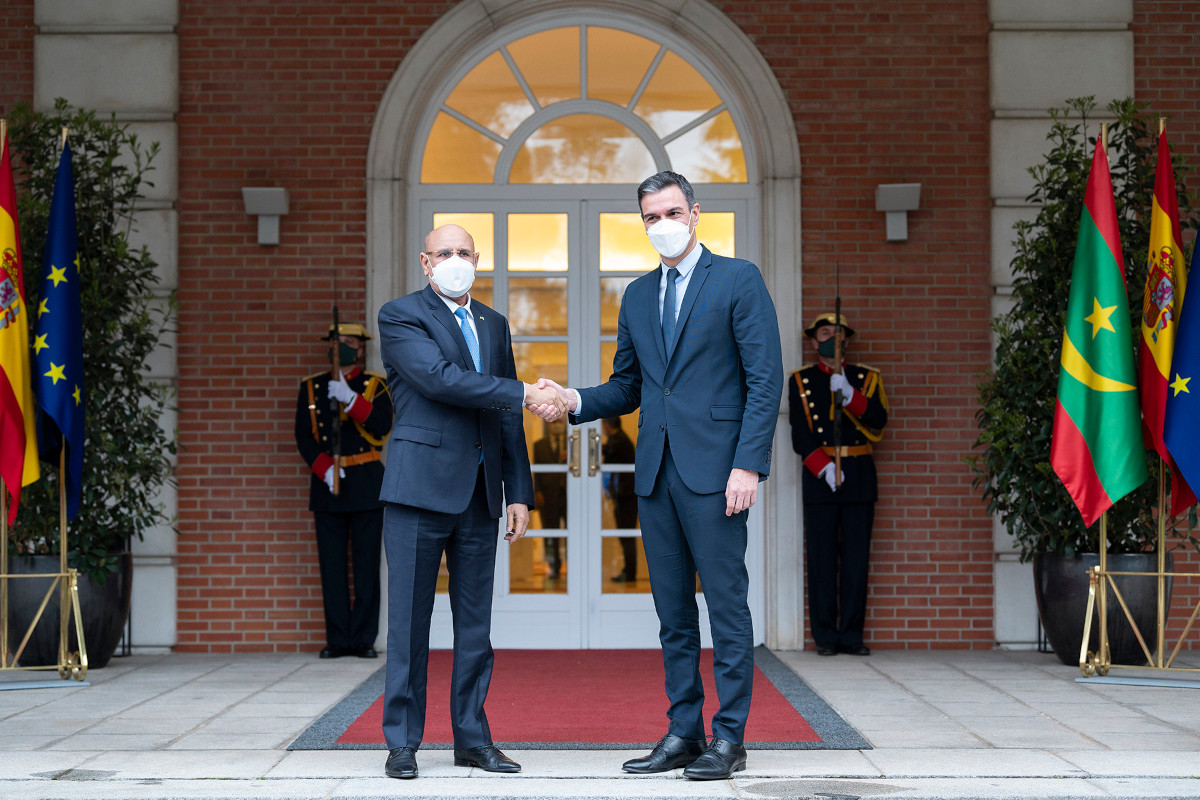
The politics behind the EU-Mauritania migration partnership
Category: Analysis
On 7 March, the EU and Mauritania signed a landmark “migration deal.” This January note from the European Commission makes the case for the deal to EU member state representatives in the Council. Dated 26 January, and therefore preceding both the public announcement of the deal on 7 February and its signing one month later, the note offers insight into the politics behind the migration partnership deal between Mauritania and the EU.

Charting a course through the labyrinth of externalisation
Category: Analysis
“Migration is a European challenge which requires a European response” has become a favoured refrain of EU officials and communiques. While the slogan is supposed to reinforce the need for a unified EU migration policy, it also masks the reality of the situation. The EU’s response to migration – in particular, irregular migration – is increasingly dependent on non-EU, and non-European states. Billions of euros and huge diplomatic efforts have been expended over the last three decades to rope non-EU states into this migration control agenda, and the process of externalisation is accelerating and expanding. Understanding the institutions and agencies involved is a crucial first step for anyone working for humane EU asylum and migration policies.

Met police to pay ‘five-figure sum’ to French publisher arrested under anti-terror laws
Category: Press coverage
The Guardian, 29 April 2024.

Putting the cart before the horse: the Commission’s proposal to increase Europol's powers
Category: Analysis
Hounded by criticism from civil society and EU member states over its new proposal to increase the powers of Europol, the European Commission has belatedly published an “analytical document” in lieu of a formal impact assessment. The new proposal would lead to the storage of vast quantities of information by Europol on human smuggling and trafficking cases, intended to increase investigations and prosecutions. However, the Commission’s document offers a minimal analysis of the potential impact on individual rights, particularly of people in vulnerable situations, and the data protection safeguards at Europol are inadequate for the proposed changes.

EU funding drone technology used by Israel in Gaza war, claim monitors
Category: Press coverage
Euronews, 23 March 2024.

European money for the war in Gaza: how EU research funding supports the Israeli arms industry
Category: Analysis
Technologies developed with financial support from Europe are being used in the current war in Gaza, as they have been previously in occupation of Palestinian territory and marginalisation of the Palestinian people.
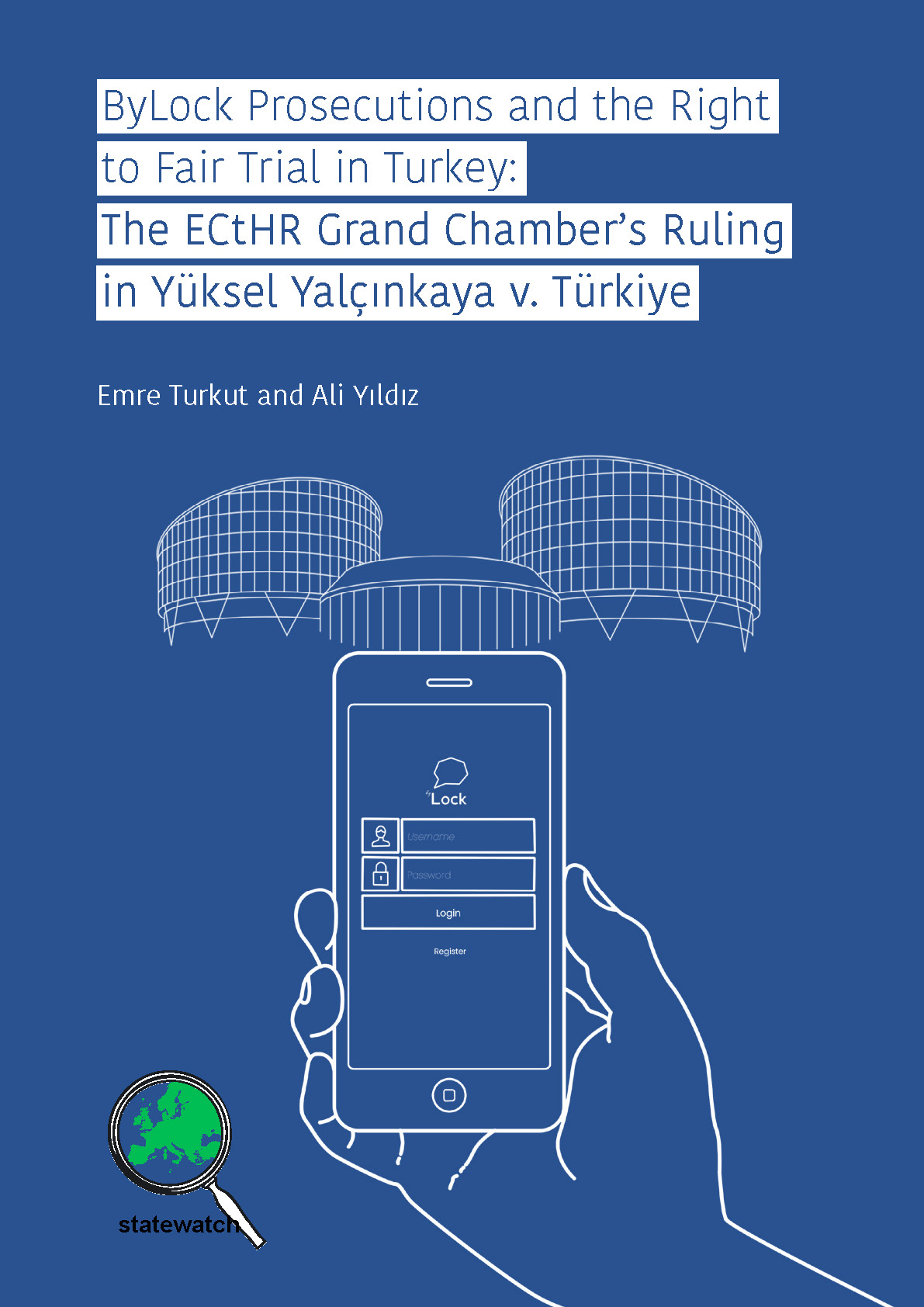
ByLock Prosecutions and the Right to Fair Trial in Turkey: The ECtHR Grand Chamber’s Ruling in Yüksel Yalçınkaya v. Türkiye
Category: Publications and reports
This report analyses the European Court of Human Rights' judgement in the case Yalçınkaya v Türkiye, which found that a conviction based on the use of the encrypted messaging app ByLock violated a number of rights: no punishment without law; the right to a fair trial; and freedom of assembly and association. The judgement represents a milestone in the legal and political discourse surrounding ByLock convictions, and should be used as the basis for retrials for the tens of thousands of people who have been punished for their alleged use of the app.

Kunstmatige intelligentie maakt de Europese grenzen nog killer. ‘Europa verschuilt zich achter technologie’
Category: News
Nederlands Dagblad, 5 March 2024.
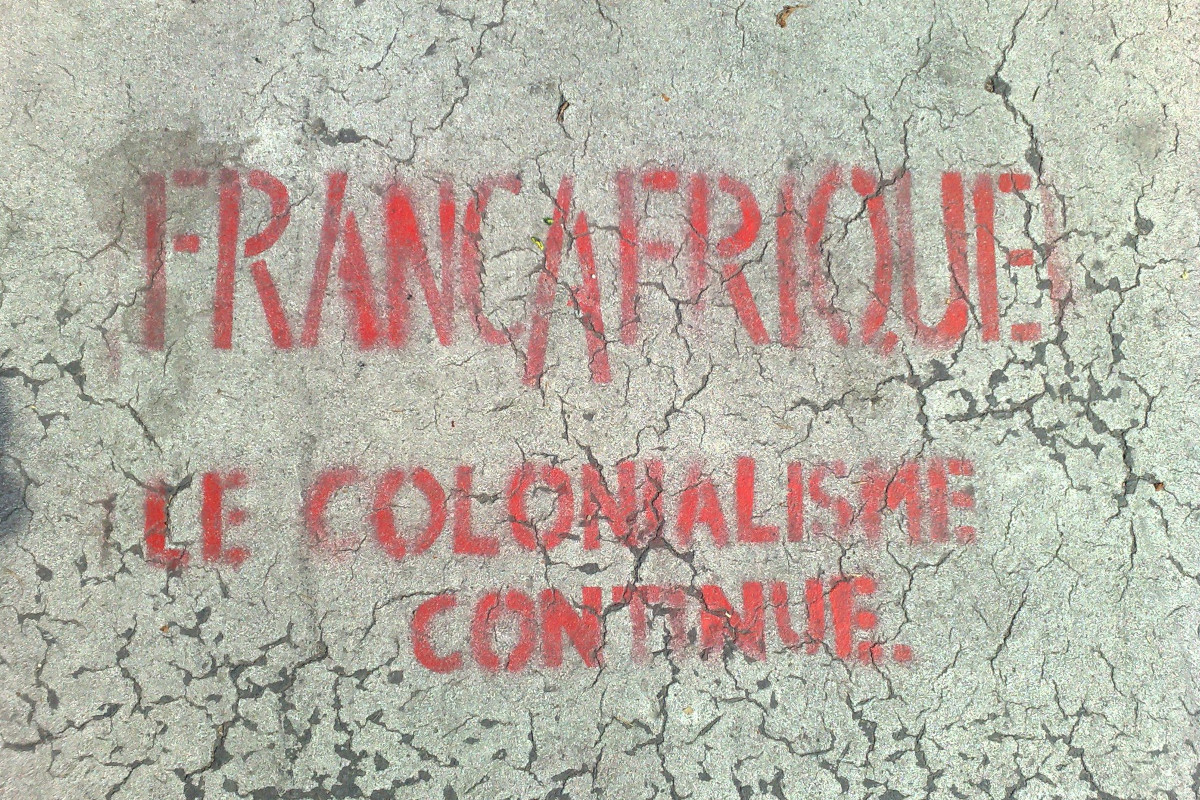
The case of Civipol: commodified mobility policing in West Africa and its colonial continuities
Category: Analysis
Current European attempts to outsource migration control to West Africa mirror historical entanglements between colonial logics, corporate interests and policing. This article looks at the place of public-private relations in French colonialism in order to historically situate the activities of Civipol, a French public-private actor owned both by the French state and major security companies, that has specialized in building African states’ internal security capacity.
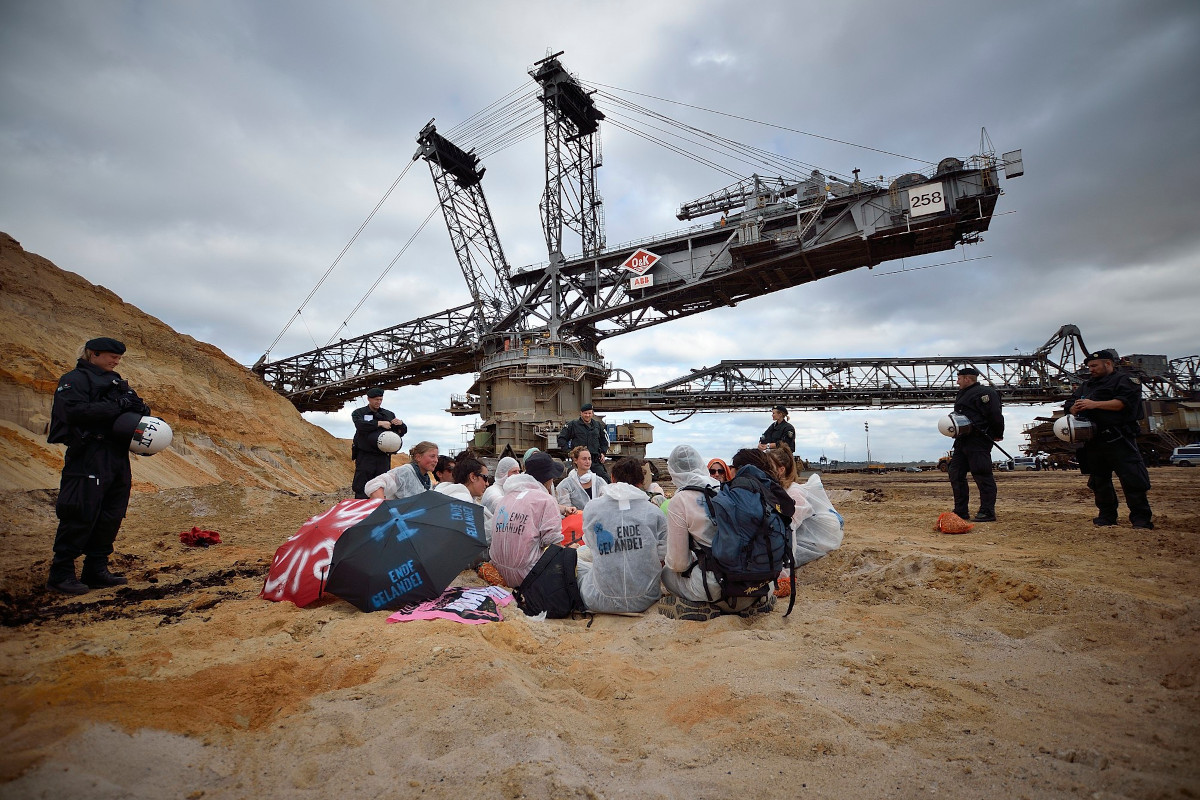
Environmental activism under the EU counter-terror microscope
Category: Analysis
Next week, EU and member state officials will discuss “the role of climate change and environmental concerns in violent extremist and terrorist radicalisation.” A discussion paper for the meeting, obtained by Statewatch, considers the threat posed by “violent left-wing and anarchist extremism” – a heading under which a number of prominent environmental protest groups are mentioned. The inclusion of peaceful but disruptive groups in the paper may legitimate further police surveillance and infiltration, legal harassment and government crackdowns – a problem identified as “a major threat to human rights and democracy” by a UN Special Rapporteur.

Border security with drones and databases
Category: Analysis
The EU’s borders are increasingly militarised, with hundreds of millions of euros paid to state agencies and military, security and IT companies for surveillance, patrols and apprehension and detention. This process has massive human cost, and politicians are planning to intensify it.

Irak ottaa nyt palautettavat kansalaisensa vastaan, Somalia kieltäytyy yhä yhteistyöstä
Category: Press coverage
Helsingin Sanomat, 26 February 2024.

Frontex and deportations, 2006-22
Category: Analysis
Data covering 17 years of Frontex’s deportation operations shows the expanding role of the agency. We have produced a series of visualisations to show the number of people deported in Frontex-coordinated operations, the member states involved, the destination states, and the costs.

The growing infrastructure and business model behind (im)migration and surveillance technologies
Category: Events
Panel co-hosted by Statewatch and Privacy International at Privacy Camp 2024 in Brussels, Belgium.

Germany: Fatal police shootings in 2022
Category: Analysis
For the year 2022, the official firearm usage statistics of the Conference of the Ministers of the Interior recorded a total of 54 shots fired at people. 11 individuals were killed as a result. This is three more than the previous year. Legally, these shots were classified as self-defense/emergency aid. 41 people were injured due to police firearm use.

USA krever fri adgang til å søke i norske registre
Category: Press coverage
Bergens Tidende, 1 January 2024.
Frontex working groups
Category: Observatory: Frontex
Frontex rules on the creation and functioning of internal working groups, and a chart of working groups as of early October 2023.

Digital rights and the protection of the right to asylum in the Charter of the European Union
Category: Analysis
The right to asylum, as delineated in Article 18 of the Charter of Fundamental Rights of the European Union (EU) (‘the Charter’), does not grant the right to asylum to every individual seeking it. Instead, it articulates that everyone is entitled to have their application for international protection examined in line with international and EU law. This principle is reinforced by Article 19 of the Charter, which strictly prohibits collective expulsions and forbids the removal, expulsion or extradition of any person ‘to a State where there is a serious risk that he or she would be subjected to the death penalty, torture or other inhuman or degrading treatment or punishment’.
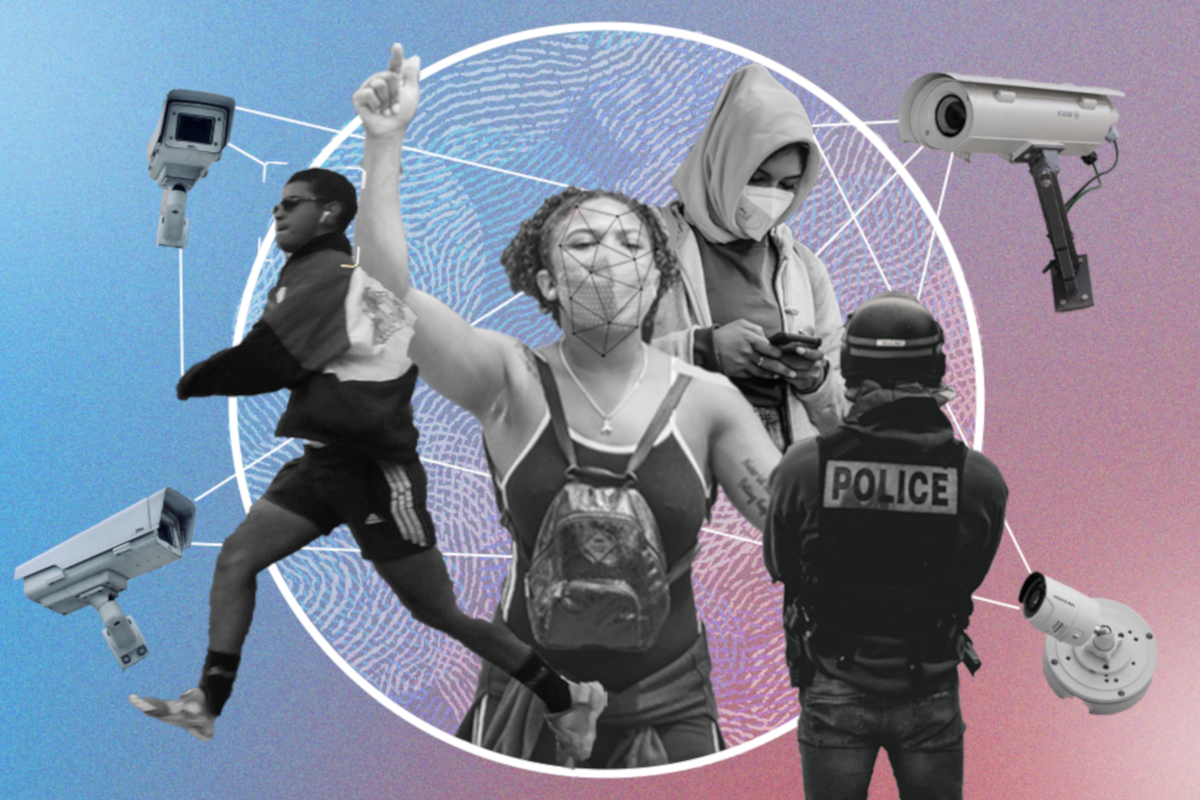
Webinar: Activists and NGOs under watch! Are you in Europol’s databases?
Category: Events
On 7 November, digital rights experts from EDRi and Statewatch will explore how civil society, activists and social movements have been increasingly criminalised and surveilled in Europe, and will introduce attendees to a new tool that will people request their data that is held by Europol. Access requests are an important tool in countering the abusive data collection practices by European police.

The new proposal on the security of EU information: a wider but incomplete legal framework for classified information
Category: Analysis
Part 3 of a series /// The proposal on security of EU information, as introduced, would create a legal framework for classified information with a number of gaps and loopholes that would prevent the European Parliament and the Court of Justice from exercising their roles as set out in the EU treaties. Changes are required to fix these problems.

The proposal on security of EU information: how to burst the bubble and open the EU fortress
Category: Analysis
Part 2 of a series /// The Commission's proposal on security of EU information threatens to fatally undermine the rules on access to documents, which are essential for transparency, openness and public participation in democratic-decision making. The European Parliament and the Council need to take action to fix the proposal on security of information. At the same time, there are clear steps they could take to improve the access to documents rules, ensuring that legislative deliberations are as open and transparent as required by the treaties.

The proposal on security of EU information: transforming the “bubble” into a “fortress”?
Category: Analysis
Part 1 of a series /// EU institutions are currently discussing a proposal for a new law "on information security in the institutions, bodies, offices and agencies of the Union." While the objective itself may be legitimate, the proposal as it stands seeks to extend to other EU institutions and agencies the secrecy and opacity that has for so long characterised the work of the Council. It undermines existing legislation on public access to official documents and would fatally undermine the treaty obligation for the institutions, bodies, offices and agencies of the EU "to conduct their work as openly as possible." At the same time, the proposal fails to ensure the interinstitutional and interagecy cooperation necessary to ensure an effective administration.

Telling the story of EU border militarization: messages, principles and language
Addressing and preventing European border violence is a huge but necessary strategic challenge. This guide offers framing messages, guiding principles, and suggested language for people and organisations working on this challenge. It emerges from a process of discussion online and in-person between over a dozen organisations working in the European migrant justice space.

Telling the story of EU border militarization
Category: Publications and reports
Addressing and preventing European border violence is a huge but necessary strategic challenge. This guide offers framing messages, guiding principles, and suggested language for people and organisations working on this challenge. It emerges from a process of discussion online and in-person between over a dozen organisations working in the European migrant justice space.

International police data-sharing: what are the UK and EU cooking up?
Category: Analysis
For the last few years, British and European officials have been seeking ways to regain the ability to instantly share police data across borders – an ability that was lost after the UK left the EU at the end of 2020. The plan currently under development is to build a new data-sharing architecture encompassing the UK, the EU and other “international partners,” but substantive details of it are being kept under lock and key. The implications go beyond privacy and data protection, and raise questions about the potential uses of a new system to crack down on the right to protest, as well as the right to seek asylum.
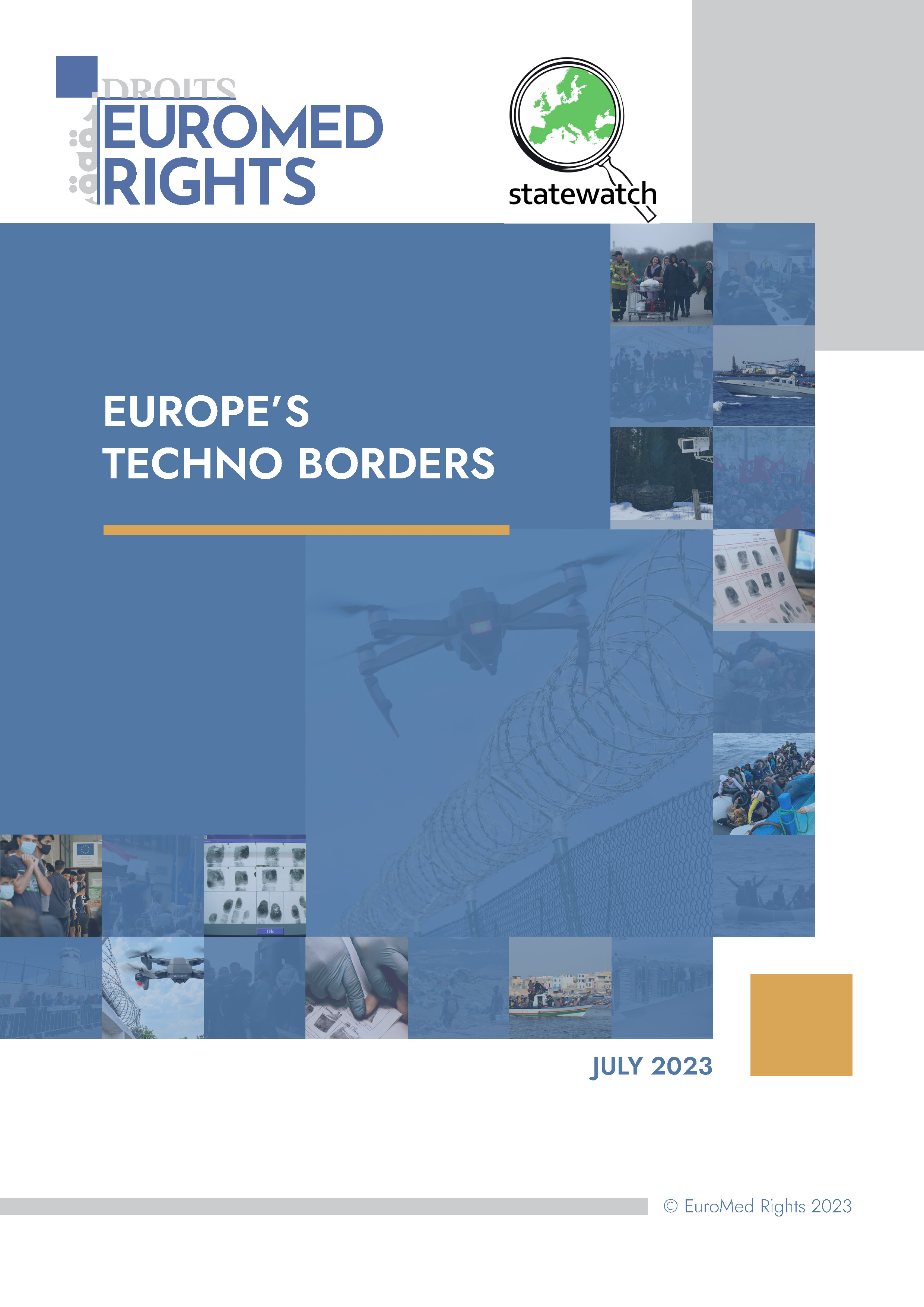
Europe's techno-borders
Category: Publications and reports
The digital technologies deployed as part of Europe’s techno-borders underpin invasions of privacy, brutal violations of human rights, and make the border ‘mobile’, for example through the increased use of biometric identification technologies, such as handheld fingerprint scanners. This report analyses the past, present and future of Europe’s “techno-borders,” the infrastructure put in place over the last three decades to provide authorities with knowledge of – and thus control over – foreign nationals seeking to enter or staying in EU and Schengen territory.

Surveillance technology and artificial intelligence: what impact for people on the move?
Category: Events
A webinar presenting a new report from Statewatch and EuroMed Rights (Europe's techno-borders); a new EuroMed Rights report (Artificial intelligence: the new frontier of the EU's border externalisation strategy); and an update on negotiations on the EU's Artificial Intelligence Act.

Externalisation of migration control: from the 1990s to the present
Category: Analysis
A talk given by Statewatch researcher Yasha Maccanico at the TransBorder Camp in Nantes, July 2022.

The green police: anti-mafia powers for environmental crime investigations?
Category: Analysis
The European Commission's proposal for a new environmental crime Directive will significantly strengthen law enforcement powers. As well as introducing a range of new criminal offences at EU level, the proposed Directive encourages the use of intrusive policing tactics against suspected environmental crime offenders. Member states, however, aim to water down the Commission’s proposal to reduce the obligations on national authorities, and are concerned about what they see as an attempt to ‘overharmonise’ national criminal laws.
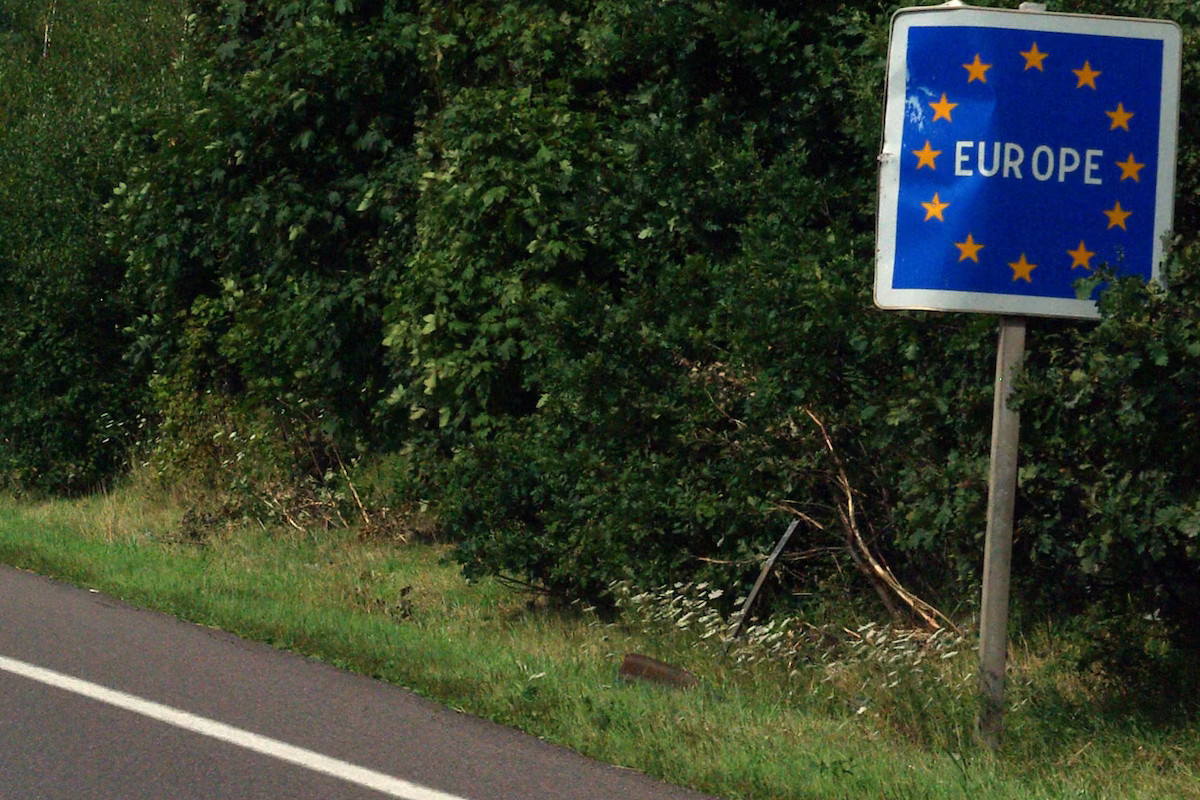
Viewpoint: How to make fences and influence people: a simple guide
Category: Analysis
Are you an EU member state looking to divert attention from the human rights abuses you are committing at your border? By following this simple guide, you can ensure that not only will the European Commission, the “Guardian of the Treaties”, turn a blind eye to those abuses, but that you will receive a healthy cash injection at the same time!
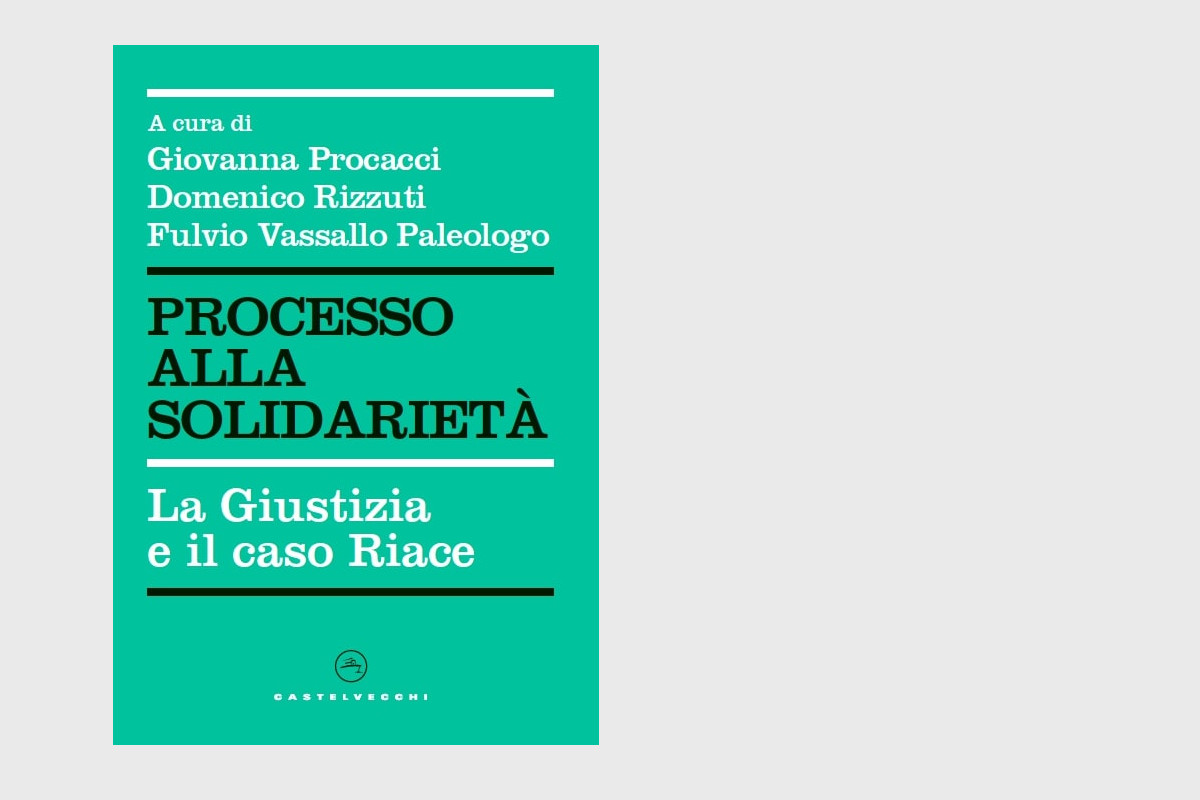
Prosecuting solidarity: extracts from a new book on the Riace case
Category: Analysis
A book about the political use of judicial proceedings to curtail a virtuous example of solidarity at work in reception practices in a small southern town in Calabria, Riace, led by its former mayor, Mimmo (Domenico) Lucano. Hearings of the appeal trial in Reggio Calabria are underway, after the first trial in Locri (whose sentence is commented on in these two extracts) found several defendants guilty, imposing lengthy prison terms (over 13 years for Lucano, over 80 years in total for 18 defendants) and financial penalties. The contributions to this book focus on the trial, the sentence, the appeal and the reality of the experience of Riace, including trial monitoring reports by Giovanna Procacci.

Submission to European Commission consultation on "security-related information sharing"
Category: Analysis
The Commission’s initiative for a ‘Security-related information sharing system between frontline officers in the EU and key partner countries’ is a further development along the path of problematic border externalisation, and a trend of increasing use of large-scale processing of the personal data of non-EU citizens for combined criminal law and immigration control purposes, that civil society has been speaking out against for years.
“Call them crazy”: Criminalisation of activists undermines rule of law in the EU
Category: Analysis
The Dutch police continue to disregard the rule of law to criminalise the pacifist activist Frank van der Linde. In recent years, his personal data has been sent to Europol, he has been labelled a terrorist, and police have suggested he be referred to a psychiatric facility. Far from an isolated case, van der Linde’s story shows just how far police in Europe will go to criminalise the right to protest and stifle political dissent.
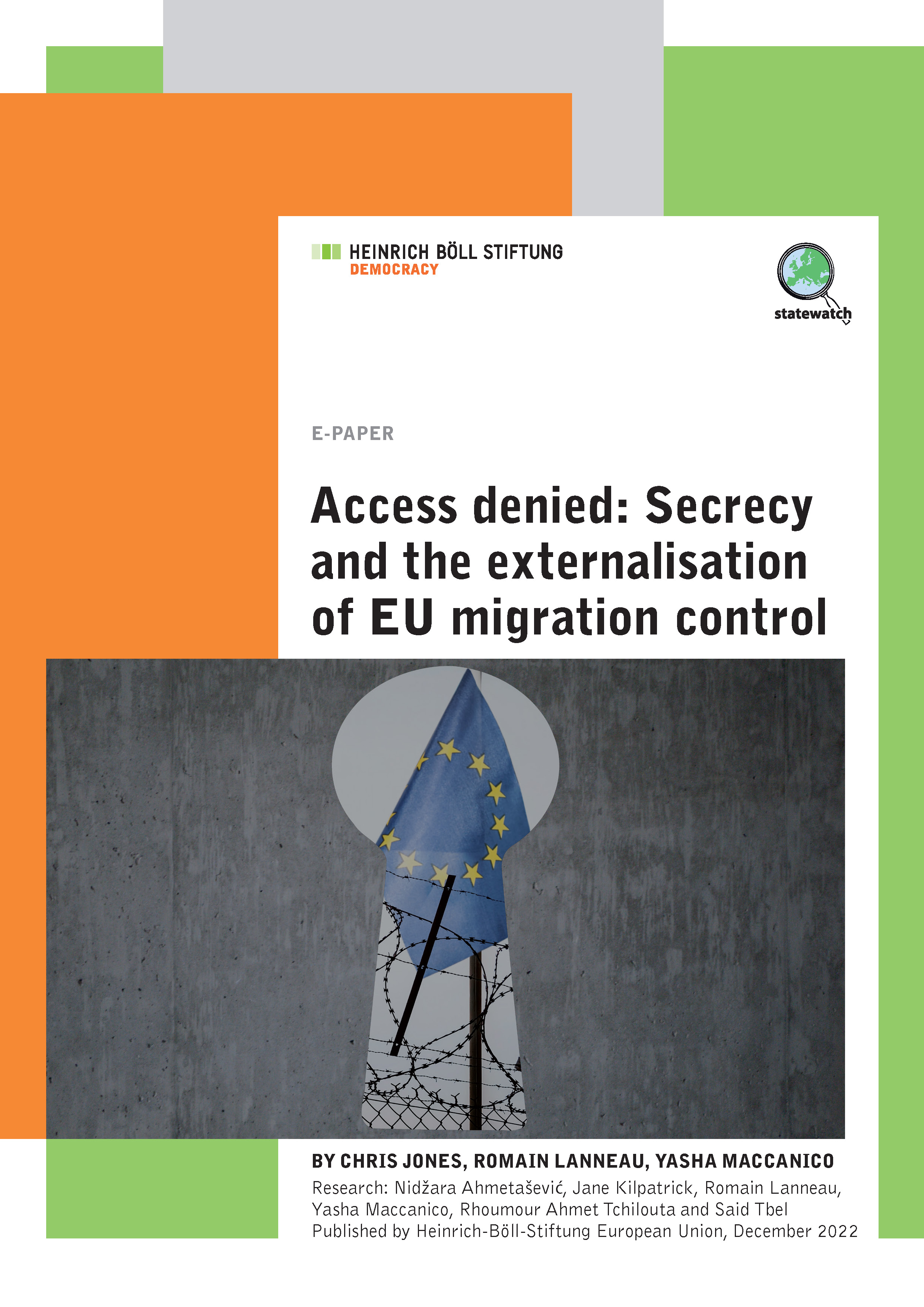
Access denied: Secrecy and the externalisation of EU migration control
Category: Publications and reports
For at least three decades, the EU and its Member States have engaged in a process of “externalisation” – a policy agenda by which the EU seeks to prevent migrants and refugees setting foot on EU territory by externalising (that is, outsourcing) border controls to non-EU states. The EU’s New Pact on Migration and Asylum, published in September 2020, proposed a raft of measures seeking to step up operational cooperation and collaboration in order to further this agenda.
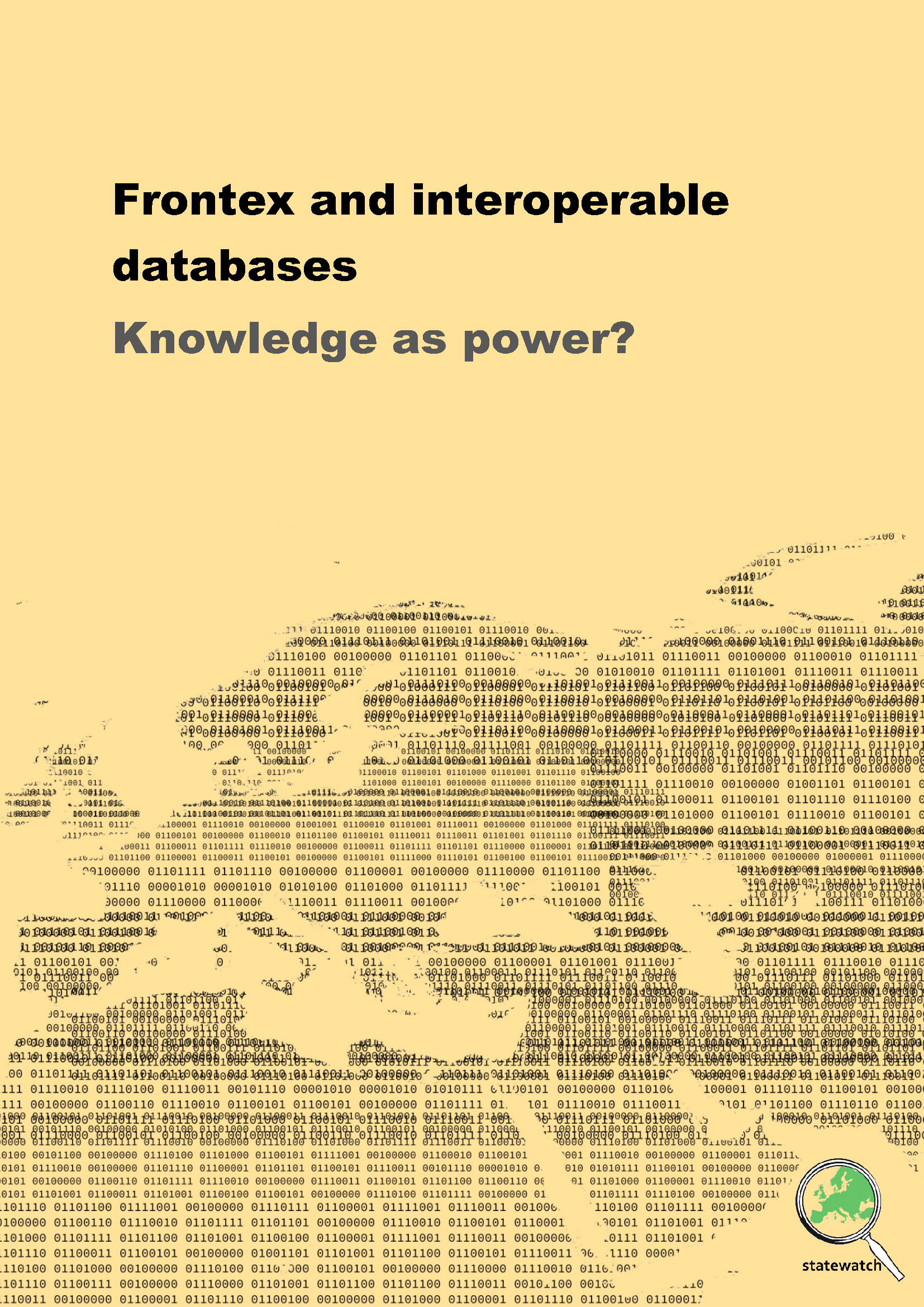
Frontex and interoperable databases: knowledge as power?
Category: Publications and reports
The EU’s border agency, Frontex, will be able to access vast quantities of data once the EU’s ‘interoperable’ policing and migration databases are fully operational. This briefing considers the agency’s use of data from two different perspectives – operational and statistical – and provides an overview of the agency’s role in the EU’s emerging “travel intelligence” architecture. It is aimed at informing understanding, analysis and critique of the agency and its role, with a view to making it possible to better understand, engage with and challenge future developments in this area.
Longtime Client Majid Khan Released from Guantánamo, to Begin New Life in Belize
Category: News
Press release by the Center for Constitutional Rights on the release of Majid Khan from Guantámo and his transfer to Belize.
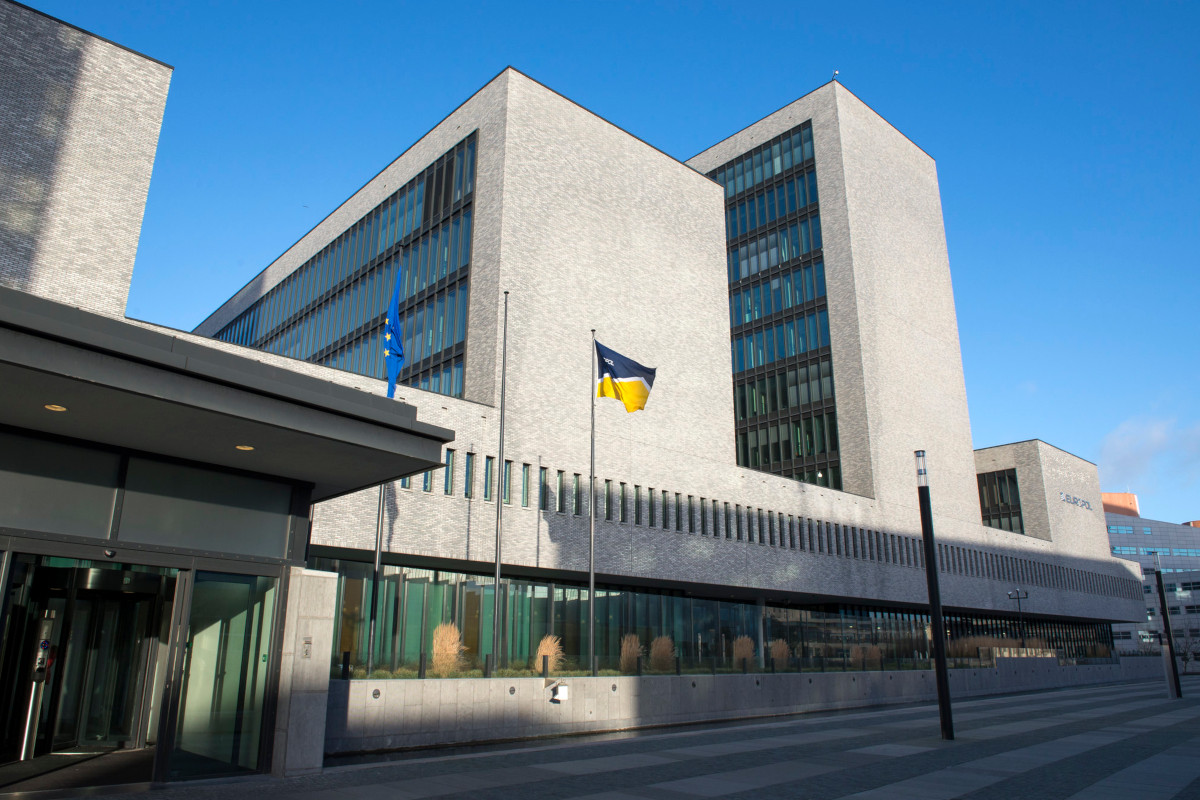
Workshop: Policing the crisis, policing as crisis: the problem(s) with Europol
Category: Events
We are hosting a workshop at Privacy Camp 2023 in Brussels.
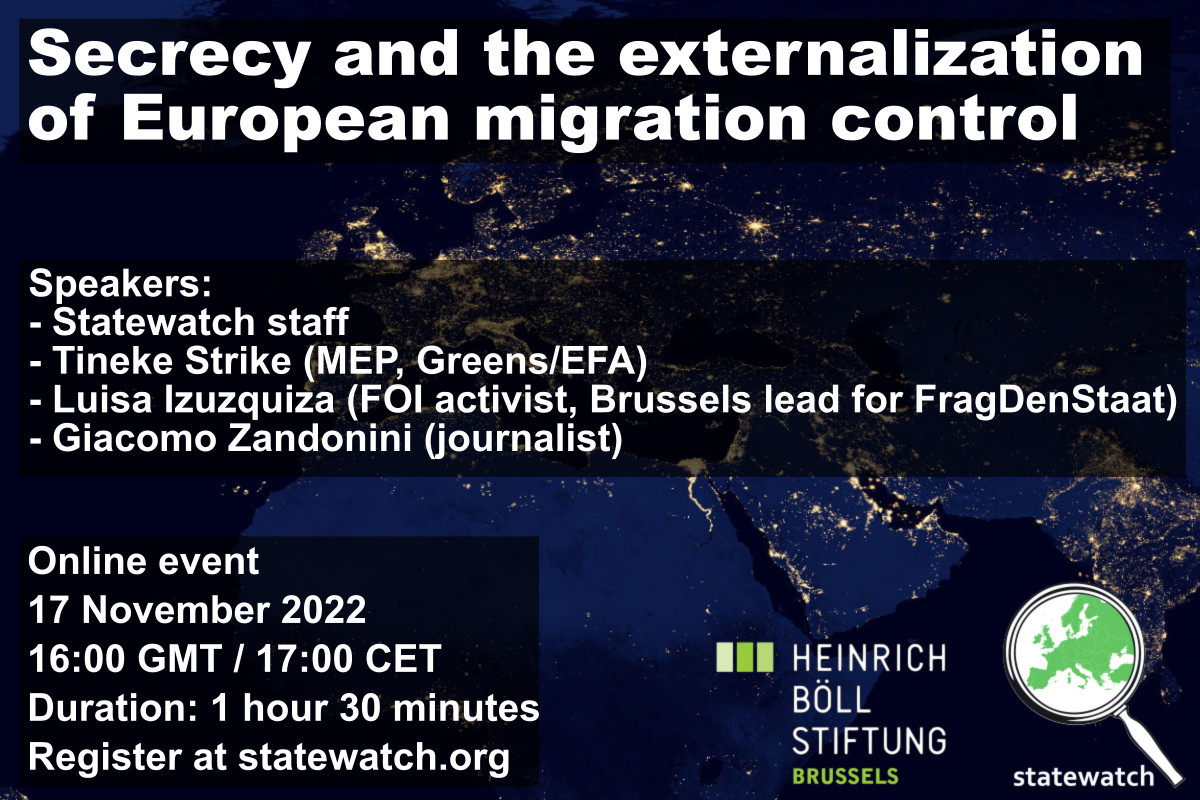
Secrecy and the externalisation of EU migration control
Category: Events
Since the EU Pact on Migration and Asylum was unveiled in September 2020, significant public and policy attention has been paid to the raft of new and recycled legal measures proposed. However, the Pact also includes a range of activities that do not undergo the same institutional to-and-fro as passing new laws.
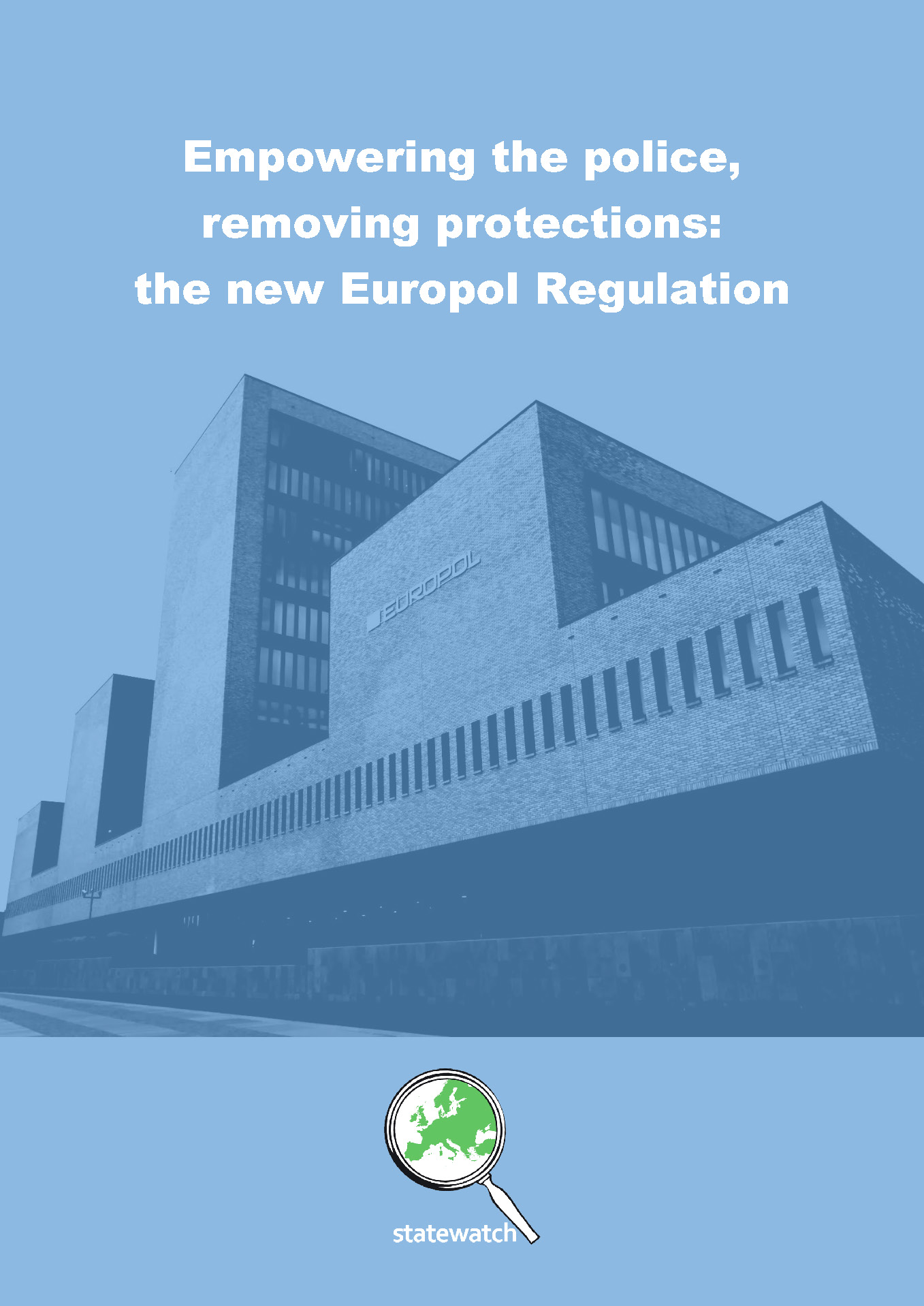
Empowering the police, removing protections: the new Europol Regulation
Category: Publications and reports
This report examines the new powers granted to EU policing agency Europol by legal amendments approved in June 2022. It finds that while the agency's tasks and powers have been hugely-expanded, in particular with regard to acquiring and processing data, independent data protection oversight of the agency has been substantially reduced.
Retroplanning for the drafting of the Agency’s implementing rules for the processing of operational personal data (Article 90 EBCG Regulation)
Category: Observatory: Frontex
List of preparatory activities, consultations and meetings by the management board of Frontex between June 2021 and December 2021 ahead of the adoption the new Frontex rules on Operational Personal Data (‘OPD’), meant to be done by the end of 2021.
Data Protection Officer comments on the draft Frontex Management Board Decisions
Documents with the first and second round of comments on the draft decisions on processing operational personal data.
CJEU judgment on the Passenger Name Record Directive
Category: Observatory: Travel surveillance and passenger profiling
The Court of Justice appears to have rewritten the EU's Passenger Name Record (PNR) Directive in a case concerning the effects of the law on fundamental rights. While the ruling introduces a number of restrictions on what the authorities may do with PNR data, it nevertheless legitmises its ongoing use as a policing tool.
FSWG exchange of view: Frontex and non-EU countries
The LIBE Committee Frontex Scrutiny Working Group (FSWG) held an exchange of views on Frontex’s activities in non-EU countries today, though certain questions by members were left conspicuously unanswered.

AI at the borders: Negotiations, regulations and fundamental rights
Category: Events
The Commission’s proposed AI Act aims to address the risks of certain uses of artificial intelligence and to establish a legal framework for the trustworthy deployment of AI. In the context of migration and border control, the Act raises significant concerns, which must be addressed in ongoing negotiations within Parliament, and in future campaigning and advocacy. Join us on Monday 16 May to discuss how AI is already used in the migration control context, and some of the key amendments that must be tabled to adequately protect the rights of people on the move.

A clear and present danger: Missing safeguards on migration and asylum in the EU’s AI Act
Category: News
The EU's proposed Artificial Intelligence (AI) Act aims to address the risks of certain uses of AI and to establish a legal framework for its trustworthy deployment, thus stimulating a market for the production, sale and export of various AI tools and technologies. However, certain technologies or uses of technology are insufficiently covered by or even excluded altogether from the scope of the AI Act, placing migrants and refugees - people often in an already-vulnerable position - at even greater risk of having their rights violated.
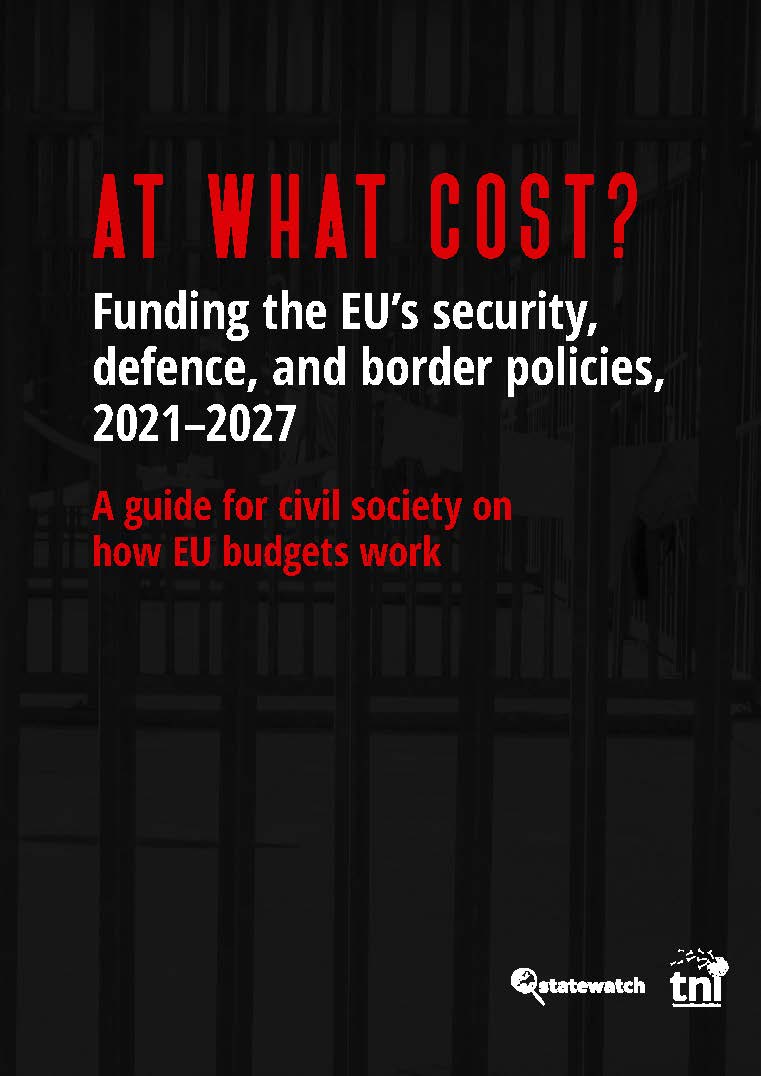
At what cost? Funding the EU’s security, defence, and border policies, 2021–2027
Category: Publications and reports
A critical guide for civil society on how EU budgets work. Co-published with the Transnational Institute.
Agreement between the European Union and the Republic of Moldova on operational activities carried out by the European Border and Coast Guard Agency in the Republic of Moldova
Category: Observatory: Frontex
MEPs withhold discharge of EU border control agency Frontex’ accounts
Category: Observatory: Frontex
Budgetary Control Committee (CONT) press release details reasons behind postponement of the decision on the European Border and Coast guard Agency accounts for 2020.
Evaluation report: JO Flexible Operational Activities in Return 2015
Category: Observatory: Frontex
Operations Division, Joint Operations Unit Return Operations Sector
Evaluation report 2014: JO Attica
Category: Observatory: Frontex
Operation division Joint Operations Unit Return Operations sector
Fundamental Rights Strategy 2021
Category: Observatory: Frontex
Endorsed by the Fundamental Rights Officer on 25 January 2021
Evaluation report: Rapid Border Intervention Exercise 2017
Category: Observatory: Frontex
2017/PRU/05 Operations Division Joint Operations Unit Land Borders Sector
Evaluation report: Joint Operation VEGA Children 2018
Category: Observatory: Frontex
Operational Response Division Field Deployment Unit Planning and Evaluation Sector
Evaluation report: Joint Operation VEGA Children 2017
Category: Observatory: Frontex
Operations Division Joint Operations Unit Air Border Sector
Evaluation report: JO Triton 2017
Category: Observatory: Frontex
Operational Response Division Field Deployment Unit
Evaluation report: JO Poseidon 2018
Category: Observatory: Frontex
Operational Response Division Field Deployment Unit
Evaluation report: Pulsar Concept Joint Operation Pegasus 2018
Category: Observatory: Frontex
Operational Response Division Field Deployment Unit
Evaluation report: Pulsar Concept Joint Operation Pegasus 2017
Category: Observatory: Frontex
Operational Response Division Field Deployment Unit
Evaluation report: Joint Operation Minerva 2017
Category: Observatory: Frontex
Operations Division Joint Operations Unit Sea Borders Sector
Evaluation report: JO Hera 2018
Category: Observatory: Frontex
Operational Response Division Field Deployment Unit
Evaluation report: Joint Operation Focal Points 2018 Land
Category: Observatory: Frontex
Operational Response Division Field Deployment Unit
Evaluation Report: Focal Points Concept Joint Operation Focal Points Air 2017
Category: Observatory: Frontex
Regular Officers: Operations Division Joint Operations Unit Air Border Sector
Evaluation report: Focal Points Concept JO
Category: Observatory: Frontex
Focal Points 2017 Air – Intermediate Managers
Evaluation report: Joint Operation Focal Points 2017 Land
Category: Observatory: Frontex
Operational Response Division Field Deployment Unit
Evaluation report: JO Flexible Operational Activities 2018 Land on Border Surveillance
Category: Observatory: Frontex
Operational Response Division Field Deployment Unit
Evaluation report: Joint Operation Flexible Operational Activities 2018 Land on Border Checks
Category: Observatory: Frontex
Operational Response Division Field Deployment Unit
Evaluation report: JO Flexible Operational Activities 2017 Land on Border Surveillance
Category: Observatory: Frontex
Operational Response Division Field Deployment Unit
Evaluation Report: Joint Operation Flexible Operational Activites land 2017 on Border Checks
Category: Observatory: Frontex
Evaluation report: Joint Operation Coordination Points 2017
Category: Observatory: Frontex
Operations Division Joint Operations Unit Land Borders Sector
Evaluation report: Focal points concept
Category: Observatory: Frontex
Joint Operation Coordination Points Air 2018
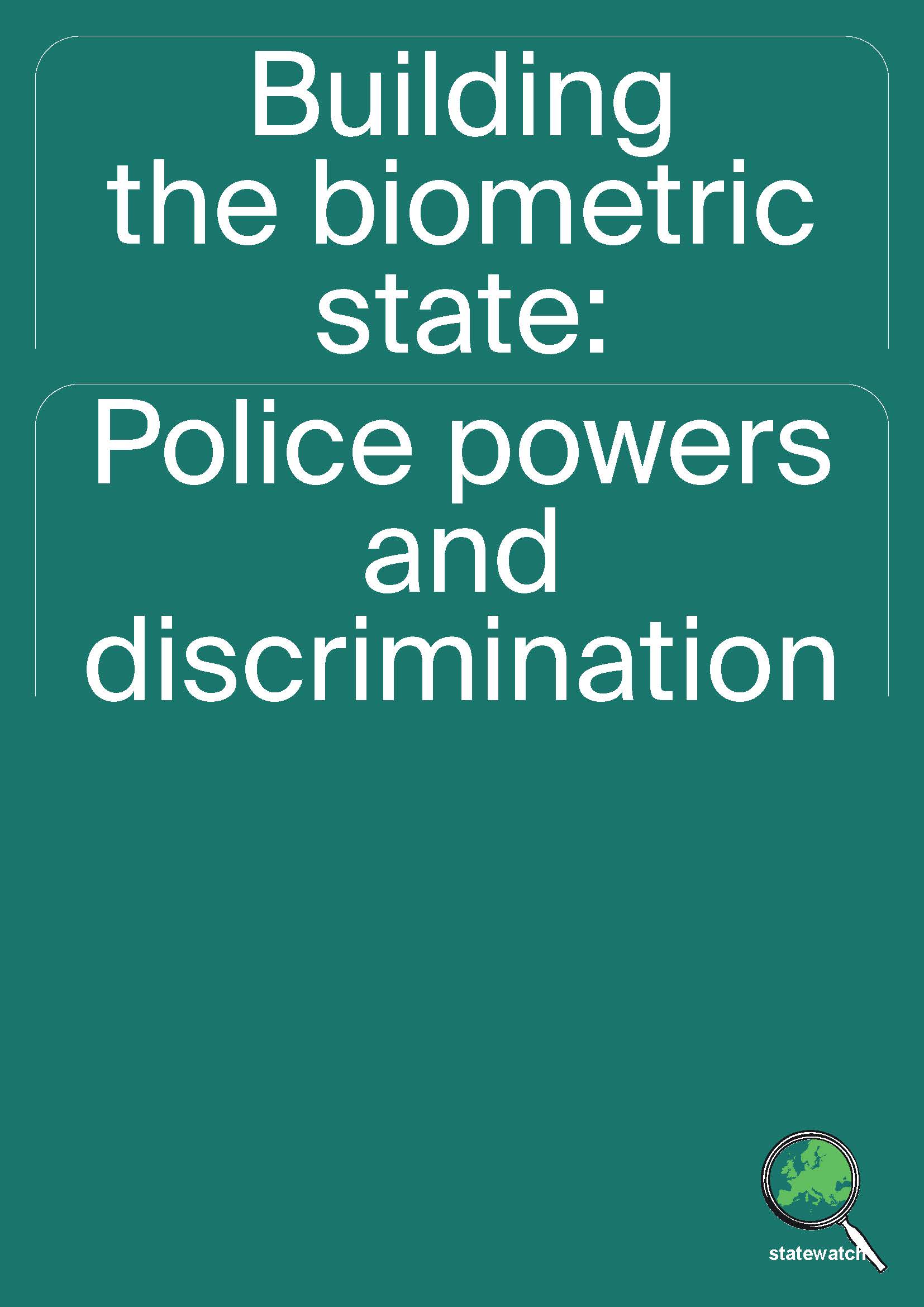
Building the biometric state: Police powers and discrimination
Category: News
This report examines the development and deployment of biometric identification technologies by police and border forces in Europe, and warns that the increasing use of the technology is likely to exacerbate existing problems with racist policing and ethnic profiling.
Mariana Gkliati and Jane Kilpatrick: Crying Wolf Too Many Times: The Impact of the Emergency Narrative on Transparency in FRONTEX Joint Operations
Category: Observatory: Frontex
Crisis-driven EU policy in recent years fits within a securitisation narrative, in which the claim of public security threat outweighs fundamental rights and their accountability safeguards. Under this policy development, Frontex, the EU Border and Coast Guard Agency, has experienced an impressive expansion in its powers and competences, without the equivalent enhancement of accountability safeguards. This article, published in the Utrecht Law Review, focuses in particular on the issue of transparency as a fundamental right and an element of social and political accountability.
Joint Operation Coordination Points 2018 Land Operational Response Division Field Deployment Unit Operational Planning and Evaluation Sector
Category: Observatory: Frontex
Frontex evaluation report 2018: Joint Operation Coordination Points 2018 Land Operational Response Division Field Deployment Unit Operational Planning and Evaluation Sector
JO Alexis 2018 Operational Response Division Field Deployment Unit
Category: Observatory: Frontex
Frontex evaluation report 2018 JO Alexis 2018 Operational Response Division Field Deployment Unit
Pulsar Concept Joint Operation Alexis 2017 Operations Division Joint Operations Unit Air Border Sector
Category: Observatory: Frontex
Frontex evaluation report 2017
Category: Observatory: Frontex
Frontex evaluation report 2017 Focal Points Concept Joint Operation Focal Points Sea 2017
Frontex staff code of conduct
Category: Observatory: Frontex
Frontex staff code of conduct 2015
Code of conduct for return operations
Category: Observatory: Frontex
Following Decision of the Executive Firector No R-ED-2018-40 adopting the code of conduct for return operations and return interventions coordinated or organised by Frontex of 26/04/2018
Annual report on sea surveillance
Category: Observatory: Frontex
Frontex´ Annual Reports on the implementation on the EU Regulation 656/2014 of the European Parliament and of the Council of 15 May 2014 establishing rules for the surveillance of the external sea borders
Annual information on the commitments of the member states to the European Border Guard teams and the Technical Equipment Pool
Category: Observatory: Frontex
Annual report on the implementation on the EU Regulation 656/2014
Frontex’ Annual Report on the implementation on the EU Regulation 656/2014 of the European Parliament and of the Council of 15 May 2014 establishing rules for the surveillance of the external sea borders.
Mariana Gkliati and Jane Kilpatrick: Frontex cooperation with third countries: examining the human rights implications
Category: Observatory: Frontex
Action brought on 21 May 2021 – SS and ST v Frontex (Case T-282/21)
Category: Observatory: Frontex
In May 2021 the organisation front-LEX filed legal proceedings against Frontex at the European Court of Justice, calling on the tribunal to force Frontex to terminate its activities in the Aegean Sea due to the "undisputed and overwhelming evidence for serious and persisting violations of fundamental rights" in the agency's area of operations. The application was made on behalf of two people - a child asylum-seeker and an adult who is now a recognised refugee in Greece, known as SS and ST - and argues that Frontex had contributed to the fundamental rights violations they suffered on the journey to Greece.

Brexit: Goodbye and hello – the new EU-UK security architecture, civil liberties and democratic control
Category: Publications and reports
The UK government's domestic programme seeks to crack down on dissent and to abolish or severely limit ways for the public to hold the state to account. This report shows that those ambitions also play a role in the post-Brexit agreement with the EU. The treaty makes it possible for the UK to opt in to intrusive EU surveillance schemes with no explicit need for parliamentary scrutiny or debate, and establishes a number of new joint institutions without sufficient transparency and accountability measures.
Action for damages for illegally deporting people and violating fundamental rights
Category: Observatory: Frontex
Court: EU General Court
MANAGEMENT BOARD DECISION 68/2021 of 21 December 2021 adopting the rules on processing personal data by the Agency
Category: Observatory: Frontex
Text of the Management Board Decision 68/2021 of 21 December 2021 adopting the rules on processing personal data by the agency.
MANAGEMENT BOARD DECISION 69/2021 of 21 December 2021 adopting the rules on processing operational personal data by the Agency
Category: Observatory: Frontex
Text of the Management Board Decision 69/2021 of 21 December 2021 adopting the rules on processing operational personal data by the agency.
Notification of the Management Board Decision 69/2021 adopting the rules on processing operational personal data by the agency
Category: Observatory: Frontex
Management Board Decision 69/2021 of 21 December 2021 adopting the rules on processing operational personal data by the agency.
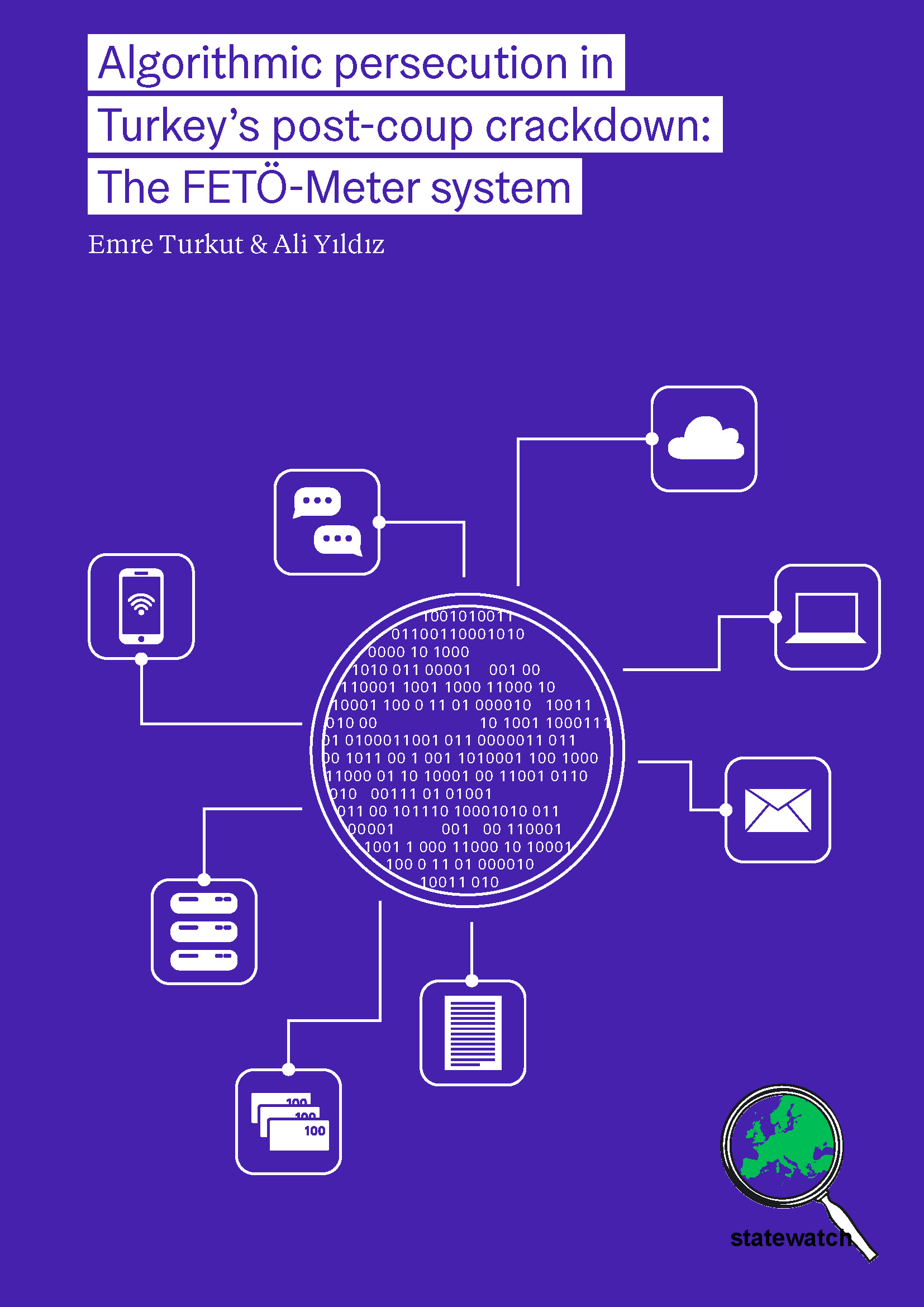
Algorithmic persecution in Turkey’s post-coup crackdown: The FETÖ-Meter system
Category: Publications and reports
Based on interviews with exiled members of the Turkish military, this report looks at how the Turkish authorities utilised something called the 'FETÖ-Meter' - an Excel-based algorithm based on hundreds of data points about individuals' activities, education, work history, family and personal contacts - to target officials for persecution in the wake of the attempted July 2016 coup.

Monitoring the state and learning from history: policing and racism in the Statewatch Library & Archive
Category: Events
We invite you to join us in exploring the connections, similarities and differences between past and present events and struggles through an examination of materials from the Statewatch Library & Archive, a collection of over 800 books, 2,500 items of ‘grey literature’ and a host of other documents and ephemera concerning civil liberties and the state.
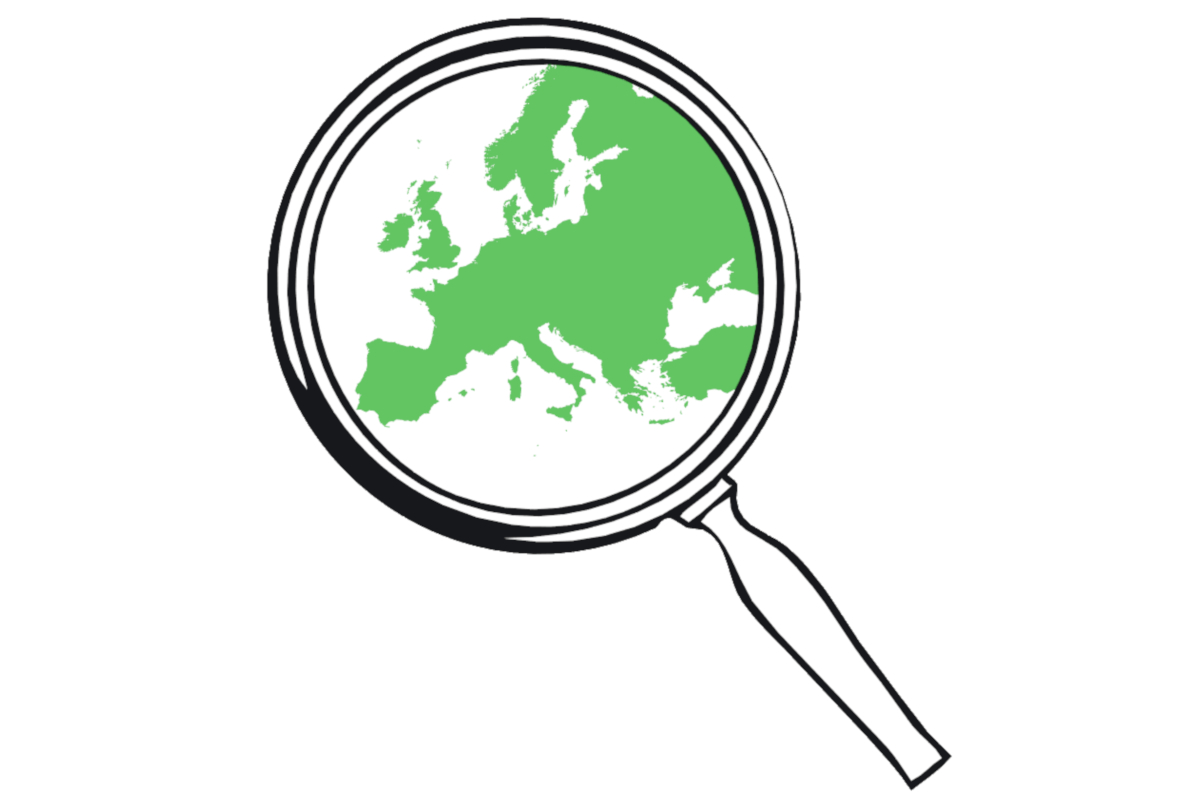
Secrecy in the European Union: how to exercise your right to information
Category: Events
This online event is held with the School for Policy Studies, University of Bristol and is supported by the Economic and Social Research Council's as part of the Festival of Social Sciences . We will look at how governments have sought to maintain secrecy in the EU, and teach you how you can exercise your right to access information.

Deportation Union: the role of Frontex
Category: Events
Join Statewatch and the Transnational Institute (TNI) on Monday 14 December for the third and final webinar in the series covering Statewatch’s report ‘Deportation Union: Rights, accountability and the EU's push to increase forced removals’.

Deportation Union: databases for expulsions
Category: Events
The second in our series of webinars exploring the report 'Deportation Union: Rights, accountability and the EU's push to increased forced removals'.
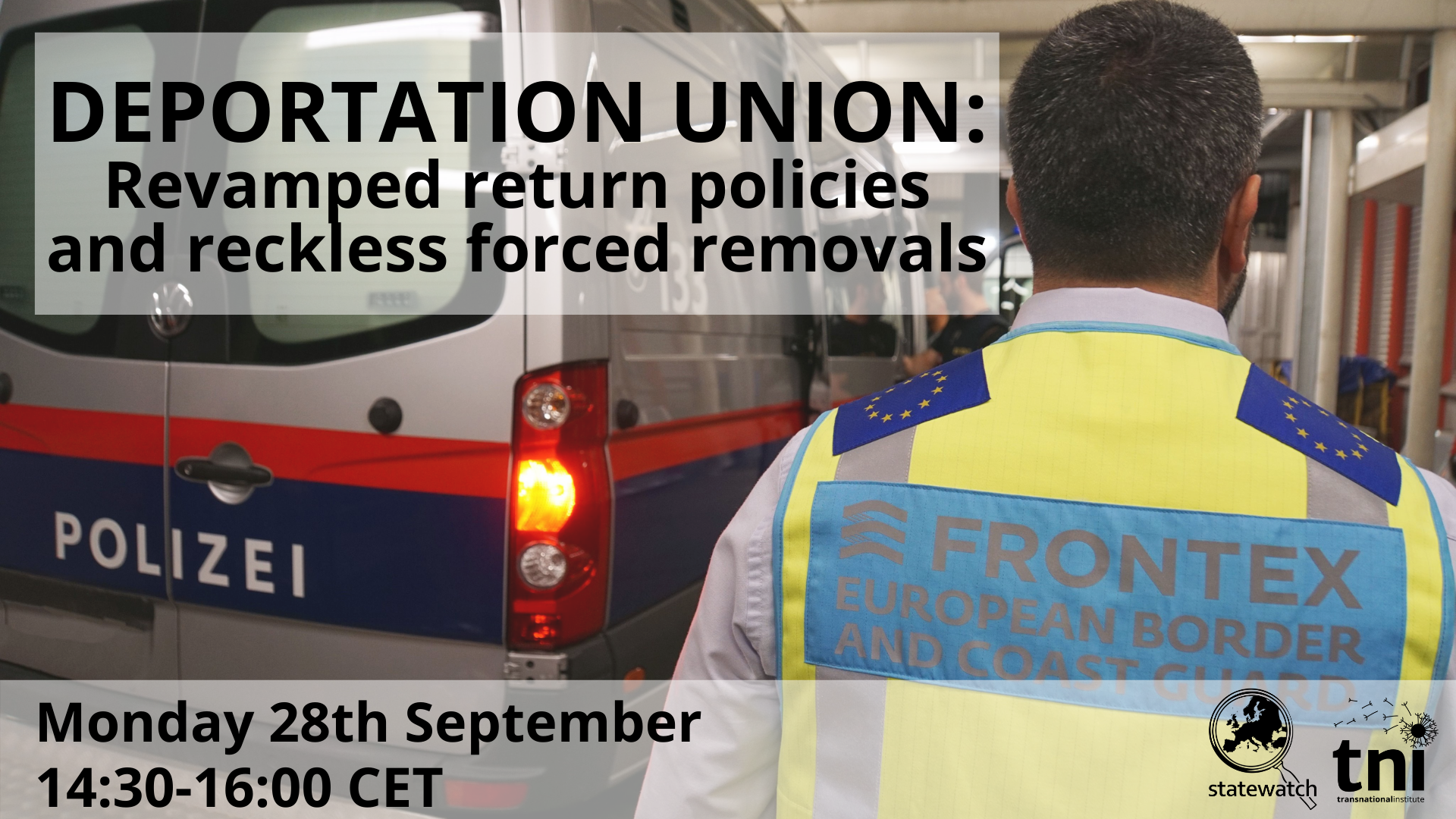
Deportation Union: revamped return policies and reckless forced removals
Category: Events
On 28 September Statewatch and TNI hosted the first webinar of a three-part series accompanying the publication of the report 'Deportation Union: Rights, accountability and the EU's push to increased forced removals'.
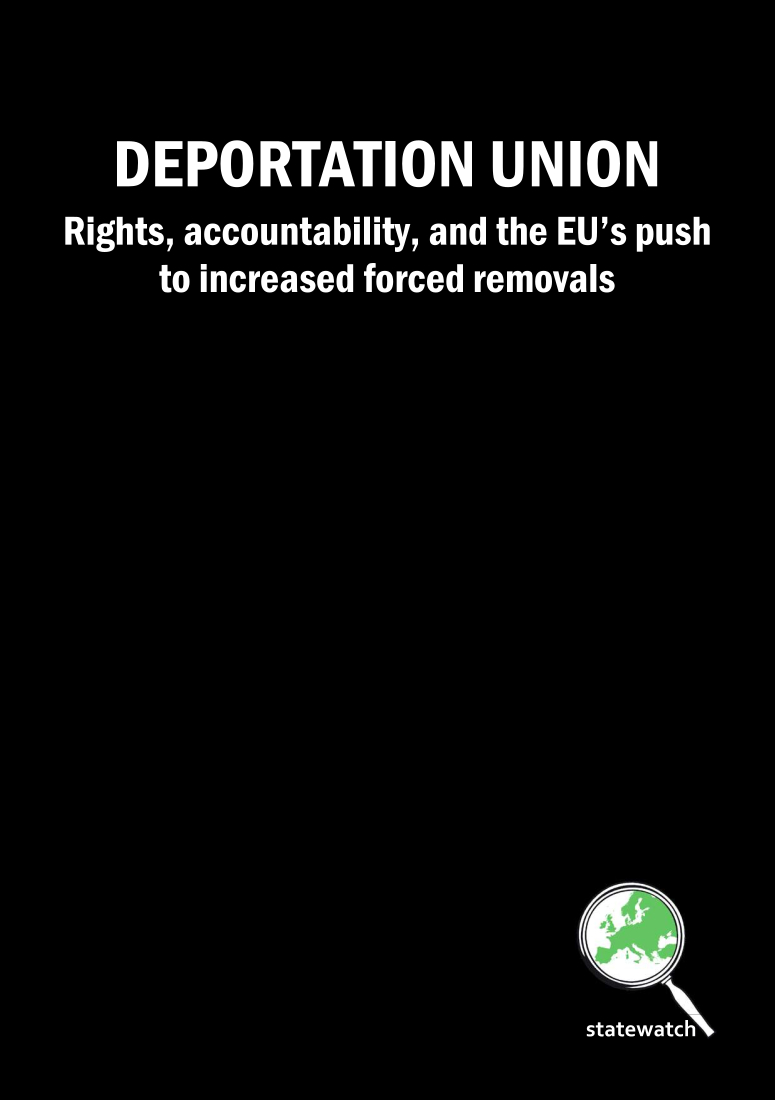
Deportation Union: Rights, accountability and the EU's push to increase forced removals
Deportation Union provides a critical examination of recently-introduced and forthcoming EU measures designed to increase the number of deportations carried out by national authorities and the European Border and Coast Guard Agency, Frontex. It focuses on three key areas: attempts to reduce or eliminate rights and protections in the law governing deportations; the expansion and interconnection of EU databases and information systems; and the increased budget, powers and personnel awarded to Frontex.
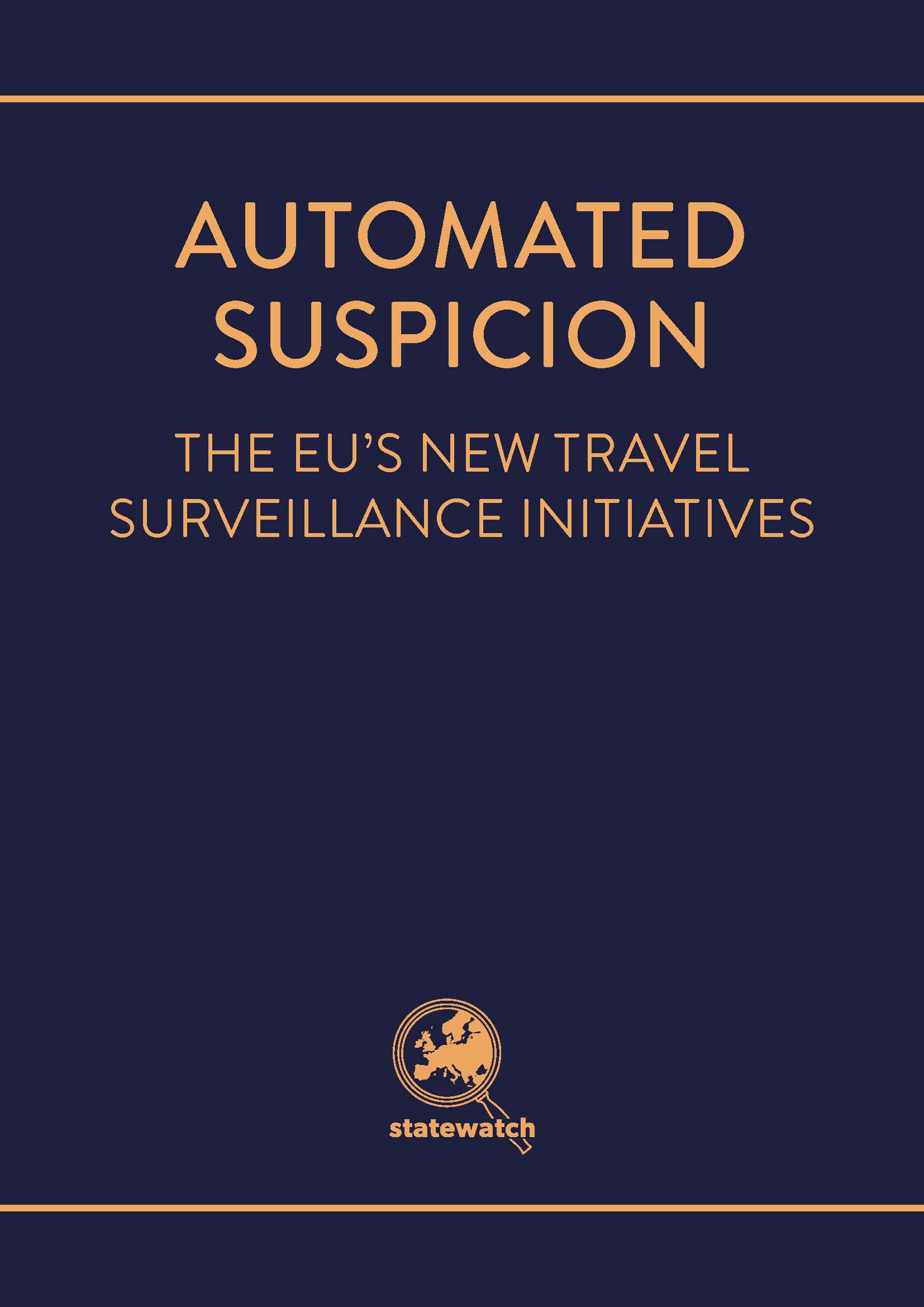
Automated suspicion: The EU's new travel surveillance initiatives
This report examines how the EU is using new technologies to screen, profile and risk-assess travellers to the Schengen area, and the risks this poses to civil liberties and fundamental rights. By developing ‘interoperable’ biometric databases, introducing untested profiling tools, and using new ‘pre-crime’ watchlists, people visiting the EU from all over the world are being placed under a veil of suspicion in the name of enhancing security.

Report launch: Automated suspicion: The EU’s new travel surveillance initiatives
Category: Events
Normal people are increasingly being treated as suspects when they travel to the EU. What are the risks for civil liberties?

Biometrics, big data and state power
Category: Events
Tue, 11 February 2020, 18:30–20:00
Northern Ireland: The legacy of collusion
Category: Events
Thursday 30 January 2020: 18.00 - 20.00 at: Statewatch, c/o: MAYDAY ROOMS, 88 Fleet St, London EC4Y
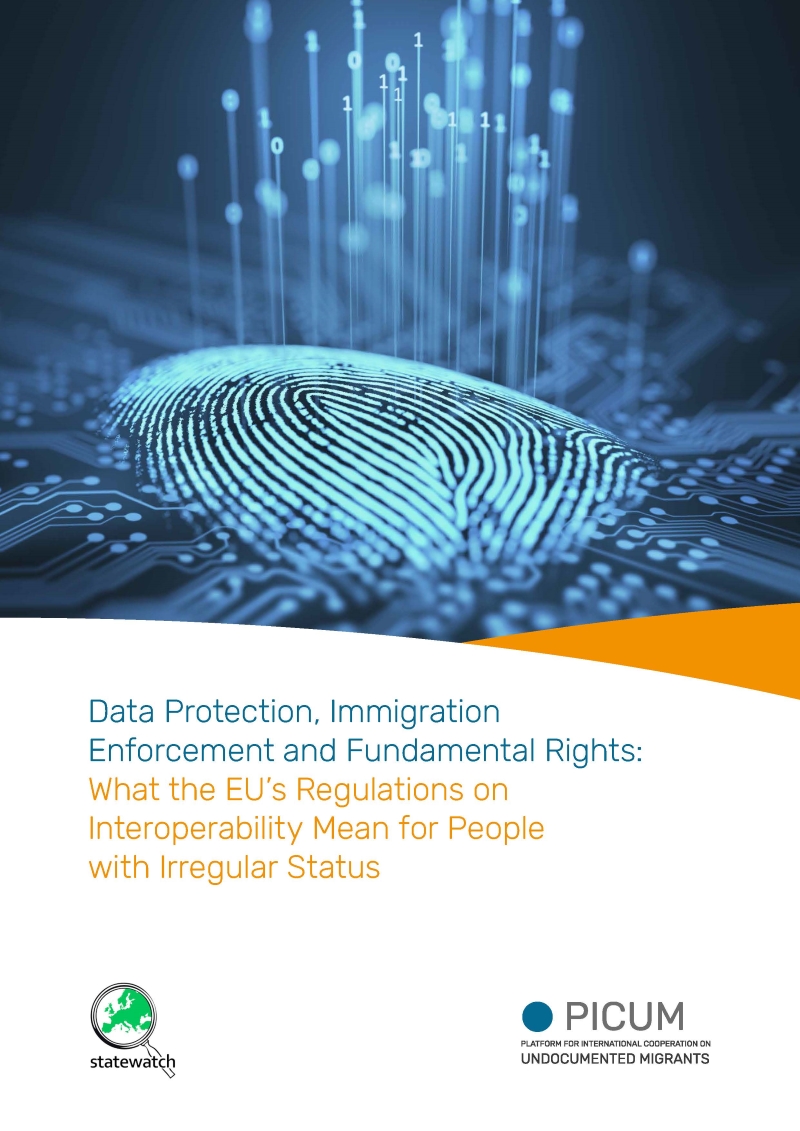
Data Protection, Immigration Enforcement and Fundamental Rights: What the EU’s Regulations on Interoperability Mean for People with Irregular Status
Category: Publications and reports
This paper examines the EU’s justice and home affairs databases and information systems, the changes that have been introduced by recent legislation seeking to make those systems ‘interoperable’ and the potential implications of those changes for fundamental rights, in particular in relation to undocumented migrants.
Launch of the Statewatch Library & Archive
Category: Events
The Statewatch Library & Archive is being launched on Thursday 22 November 2018 at May Day Rooms in London: 18.00 - 20.00.
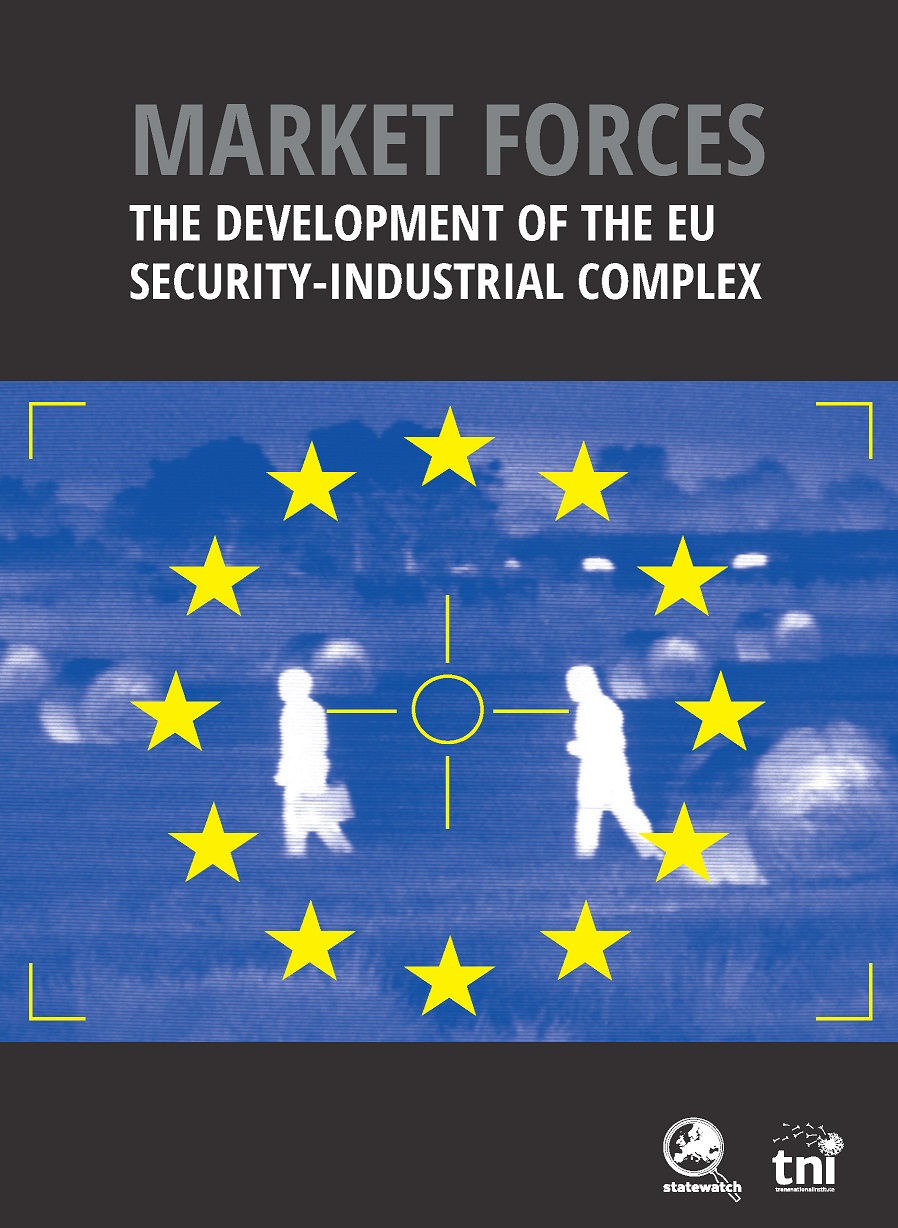
Market Forces: the development of the EU security-industrial complex
While the European Union project has faltered in recent years, afflicted by the fall-out of the economic crisis, the rise of anti-EU parties and the Brexit vote, there is one area where it has not only continued apace but made significant advances: Europe’s security policies have not only gained political support from across its Member States but growing budgets and resources too.

Eurodrones, Inc.
Eurodrones, Inc. tells the story of how European citizens are unknowingly subsidising through their taxes a controversial drone industry yet are systematically excluded from any debates about their use. Behind empty promises of consultation, EU officials have turned over much of drone policy development to the European defence and security corporations which seek to profit from it.
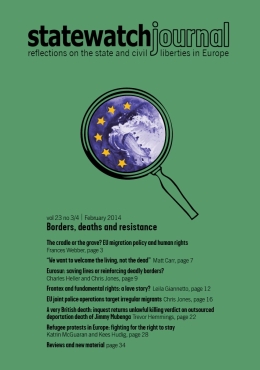
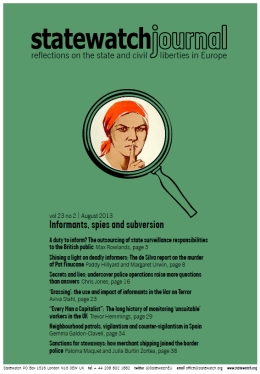
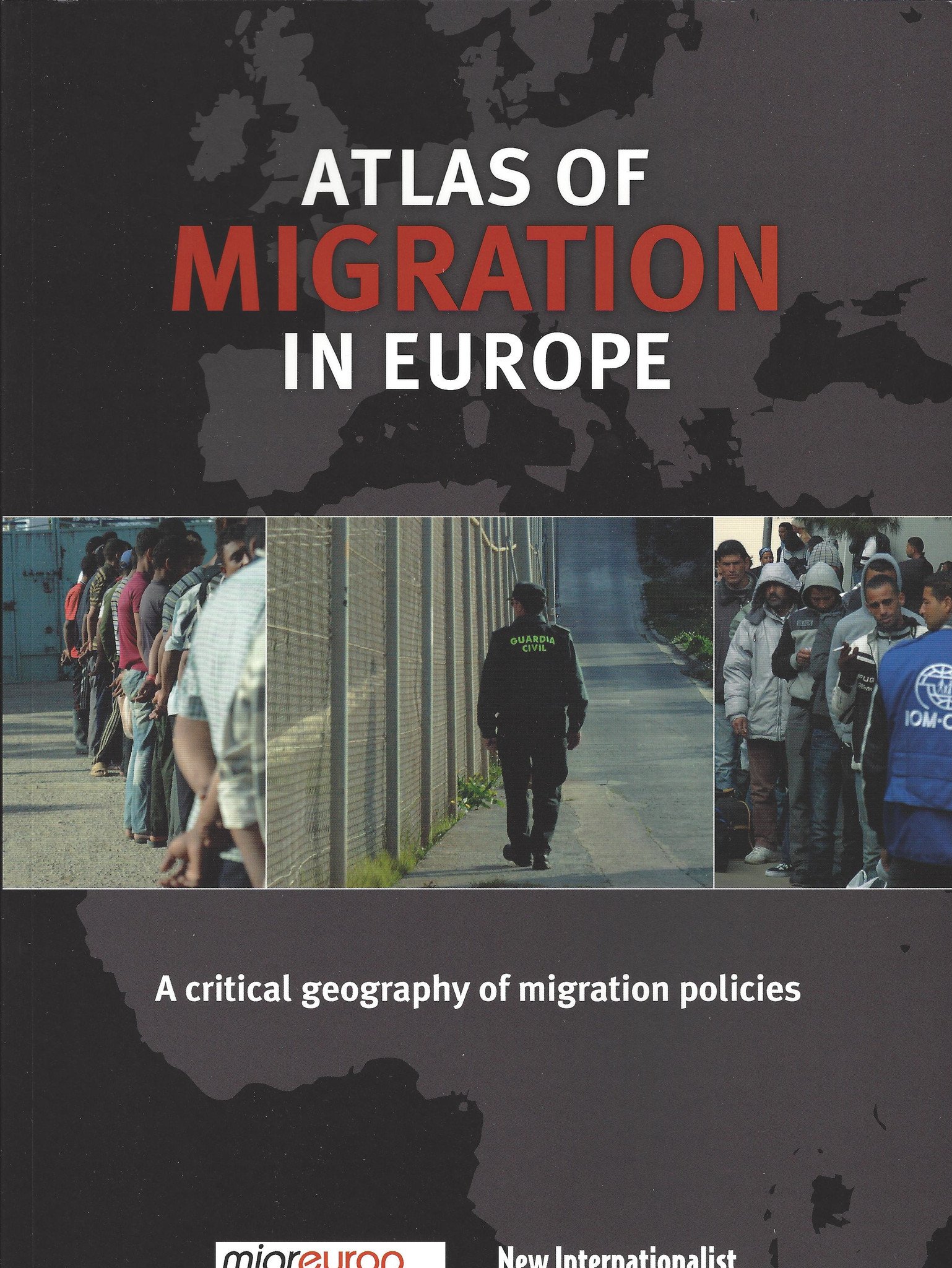
The Atlas of Migration in Europe
The second edition of Migreurop's Atlas of Migration in Europe.

Back from the battlefield: domestic drones in the UK
Back from the battlefield: domestic drones in the UK aims to contribute to the public debate on the use of drones within the UK.
SECILE: Does counter-terrorism just counter terrorism?
<p>Securing Europe through Counter-terrorism: Impact, Legitimacy and Effectiveness (SECILE)</p>
JUSTICIA: European Rights Network
<p>A joint initiative of 19 independent civil society organisations in 17 members states</p>
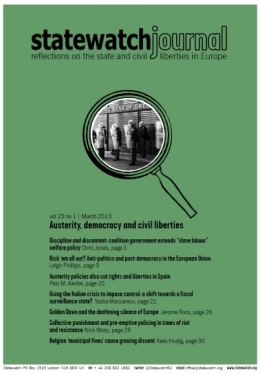
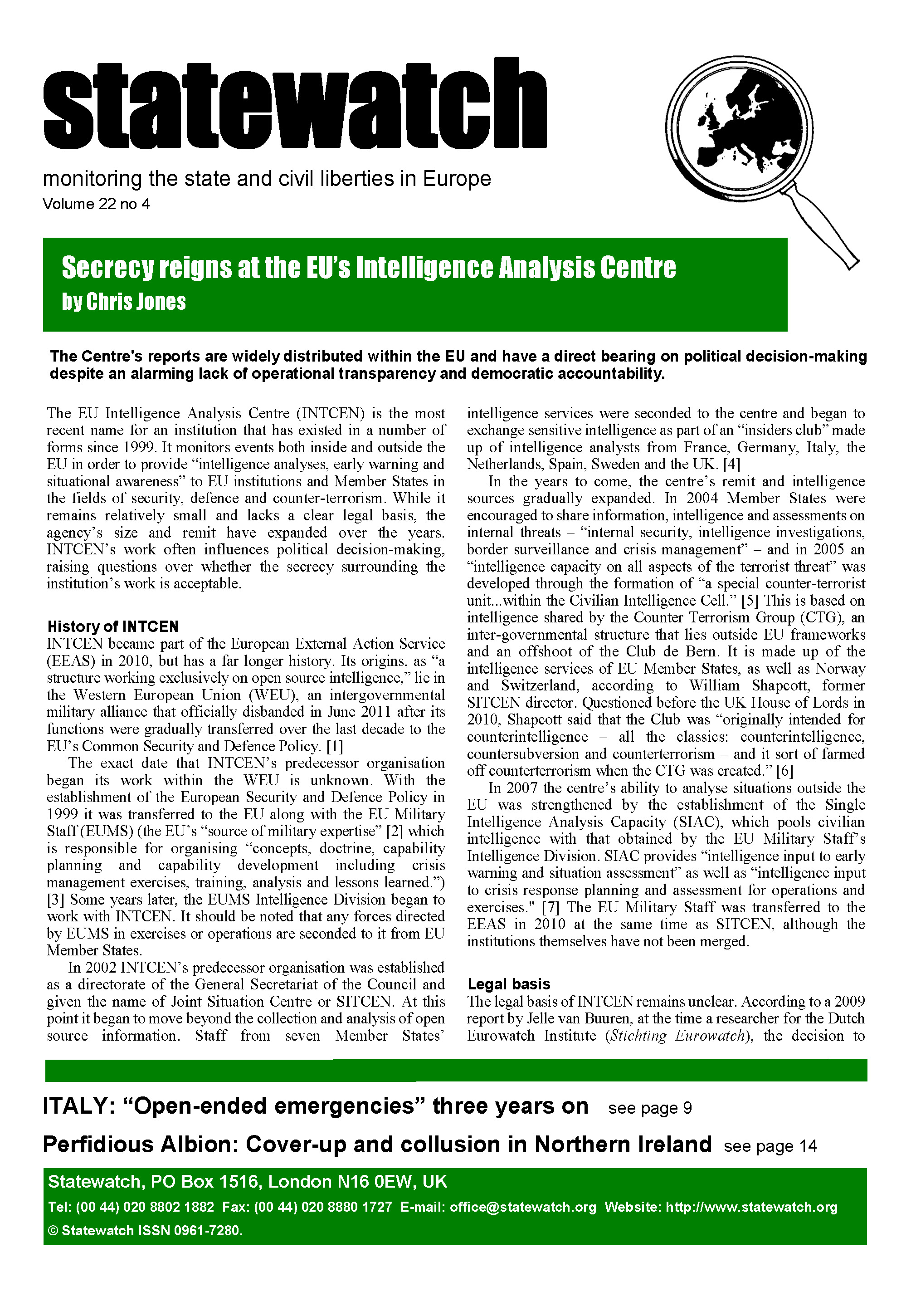
Vol 22(4): EU intelligence secrecy; Roma expulsions; Italy's open-ended emergency; Northern Ireland cover-ups
Cover story: Secrecy reigns at the EU’s Intelligence Analysis Centre
Access to EU documents: Calling the agencies to account
<p><em>Statewatch</em> complaints to the European Ombudsman regarding the transparency obligations of Frontex, Europol and Eurojust</p>
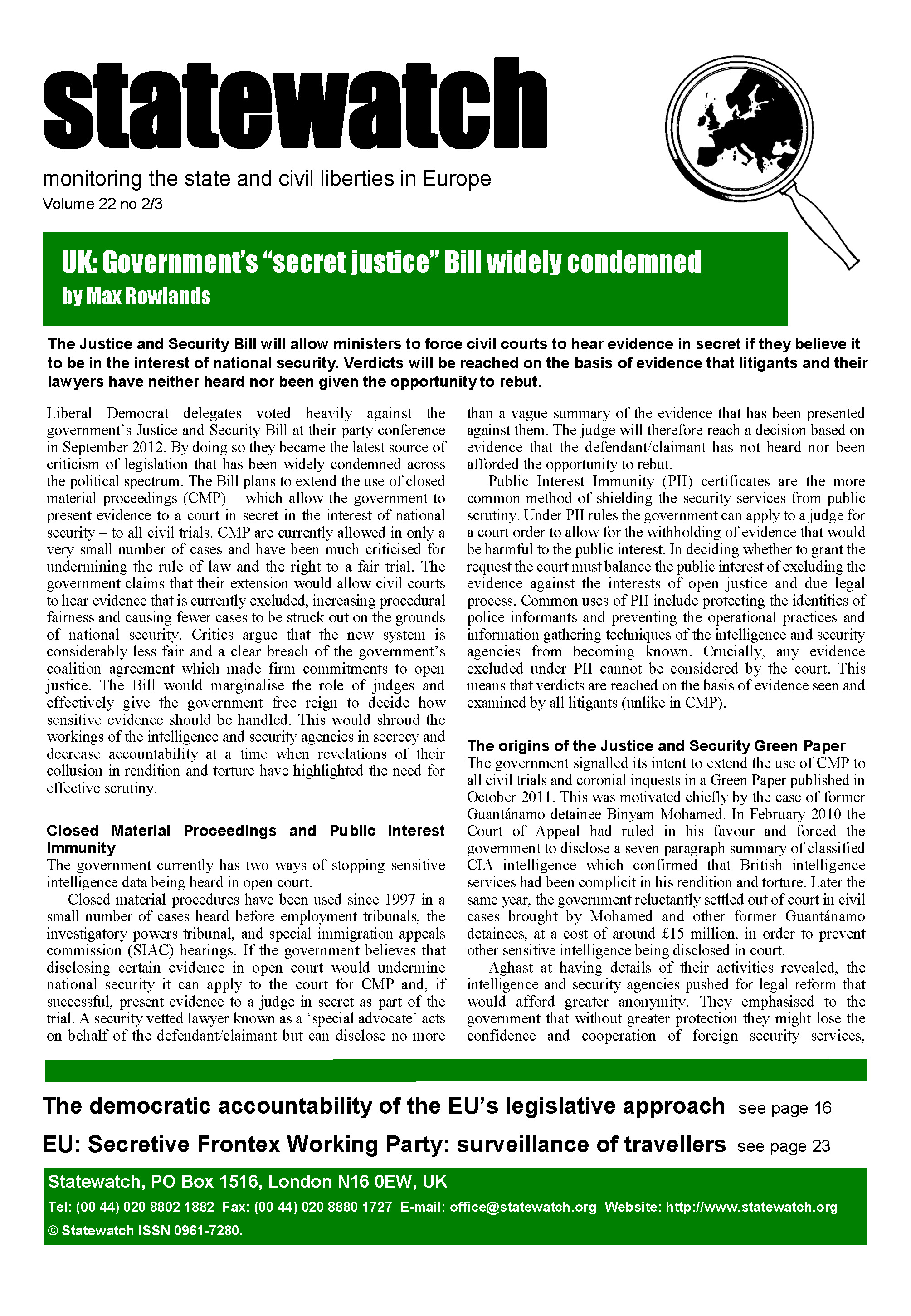
Vol 22(2/3): UK secret justice; when dissent becomes subversion; Sean Rigg's death; Frontex and travel surveillance
Cover story: UK: Government’s “secret justice” Bill widely condemned
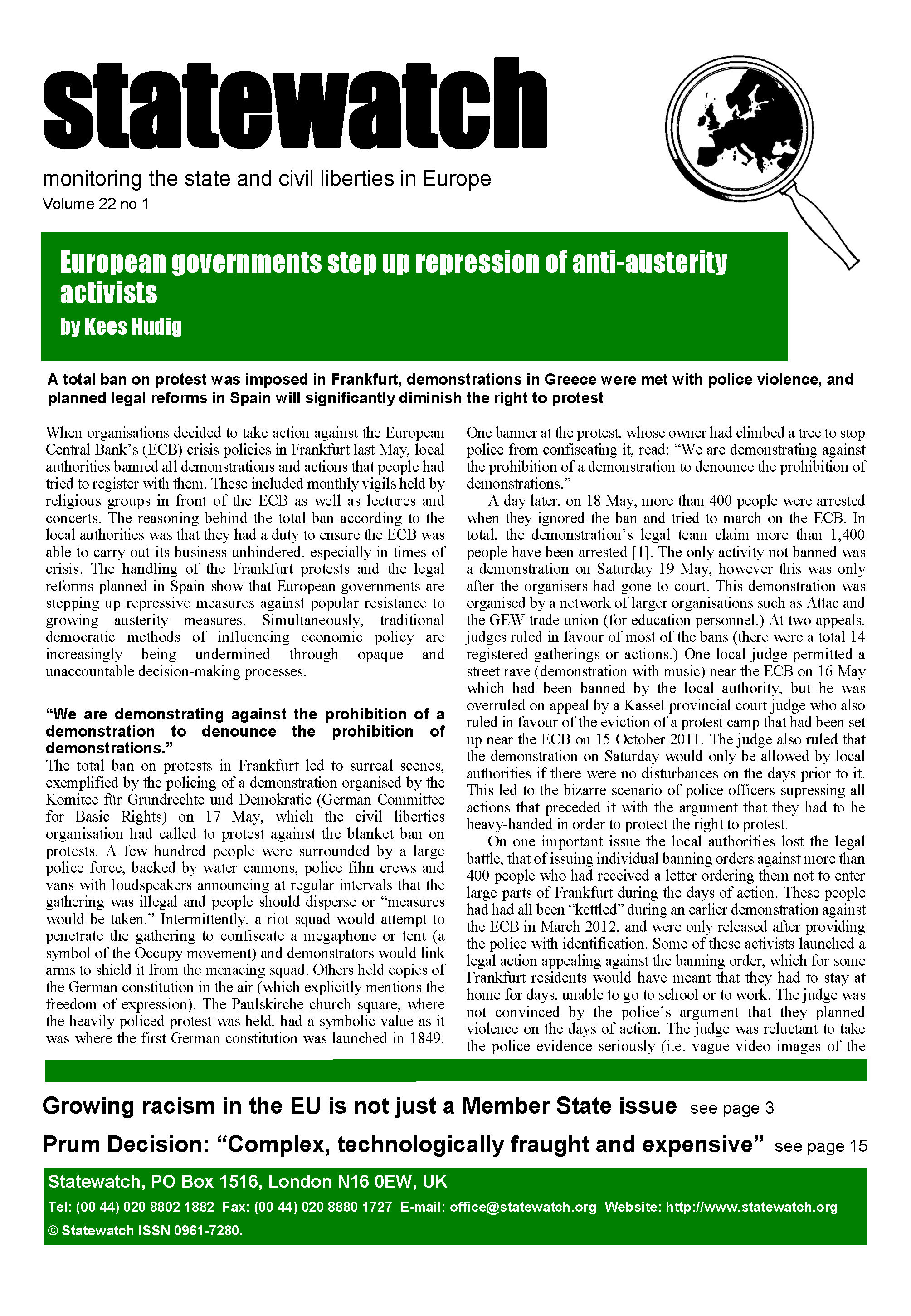
Vol 22 (1): Repression of anti-austerity activists; growing racism in the EU; regulating civil society
Cover story: European governments step up repression of anti-austerity activists
Research for the Safety Not Surveillance coalition
<p>February 2026-January 2028</p>
Artificial intelligence in EU justice and home affairs policies
<p>October 2025-October 2027</p>
Border externalisation and technologies of control
<p><em>September 2025-February 2027</em></p>
A watchdog for EU justice and home affairs policies
<p>Monitoring EU law, spending, policies and practices in the field of justice and home affairs </p> <p><em>July 2025-June 2028</em></p>
Outsourcing borders
<p>Monitoring EU externalisation policy</p> <p><em>February 2024-April 2026</em></p>
Migration Control
<p>Who gets paid, to stop the world's refugees?</p>
Moving Stories
<p>How journalism plays follow-my-leader with rhetoric of negativity</p>
Invisible Borders
<p>A prize-winning cross-border investigative journalism project</p>
EU justice and home affairs agencies
<p>Transparency, accountability and fundamental rights</p>
The “security playbook” and migrants’ rights activism
<p>Examining the criminalization of migrants’ rights work and how this is driven by or intersects with the overreach and abuse of security and counter-terrorism laws, policies, measures, and technological tools.</p>
Following the roadmap: unmasking the EU’s security AI plans
<p>Exposing and explaining security AI projects being undertaken behind closed doors by national and EU officials.</p>
Data exchange, exclusion and denial at the borders
<p>Upholding the right to an effective remedy</p> <p><em>November 2023-October 2025</em></p>
Networks of (in)security
<p>This project aims to strengthen global civil society efforts to counter the use of international counter-terrorism and security norms as a means for undermining or restricting civic space and human rights.</p> <p><em>February 2023-November 2025</em></p>
Spotted an error? If you've spotted a problem with this page, just click once to let us know.